A Happy PhD
A blog about doctoral productivity, supervision and wellbeing..
Looking for tips, tricks and advice to finish your doctoral thesis on time and with high spirits? Baffled by how little information is out there about how to support PhD students to become independent researchers? As an ex-doctoral student now co-supervising five students , I feel your pain.
“A Happy PhD” is a blog where I distil what has worked for me, as well as recent research in doctoral education, psychology and many other fields. Join our newsletter , or follow the blog on Twitter , Facebook , or via RSS .

New to the blog? Start here.
Are you looking for…
Common problems and challenges in doing the PhD, from mental health (e.g., depression or anxiety) or productivity challenges , to writing or dropping out of your PhD .
Mental health and wellbeing tips and advice : common mental health symptoms in the PhD , tips to avoid dropping out of the doctorate , the importance of sleep , holidays or advice from positive psychology to keep yourself motivated during the PhD.
PhD productivity tips and advice : from the classic Pomodoro technique , to avoiding to-do list overwhelm , dealing with multiple projects and priorities , staying productive and motivated , how I manage my daily tasks or how I do my weekly reviews .
PhD-specific tools , like the CQOCE diagram to conceptualize your PhD, the NABC method to structure your research presentations, or the process I use to write scientific papers or make big career decisions .
Supervision tips and advice , about giving feedback on student papers , or supporting a sense of progress in your doctoral students .
What (else) do I write about?
Recent posts.

Two Hundred Weeks: Productivity for Mortal PhD Students (book extract)
Is there a way to be productive in our PhD without falling into all-out work obsession and burnout? What habits and systems could help us make good use of our (inherently limited) time and effort, taking into account that we could die tomorrow? In this second part of our Four Thousand Weeks book summary, we look at some of the tactical and strategic advice stemming from the productivity mindset shifts the book suggests – filtered and contextualized for doctoral students aware of their finitude.

Productivity as Avoidance, or How *Not* to Think about Doctoral Productivity (book extract)
If you are a doctoral student struggling to move your dissertation forward, especially in the face of additional jobs, teaching, family, or other obligations, the thought of becoming more productive can be very appealing – to the point of becoming a sort of obsession. After our review of (somewhat caricaturesque) doctoral productivity and anti-productivity arguments , in this post I summarize some of the ideas in Oliver Burkeman’s recent book, Four thousand weeks , which I have found very helpful to reach a balance between my own productivity obsessions and the abandoning of all hope of being any good at my daily research activities.

Is Doctoral Productivity Bad?
In this blog I have written a lot about doctoral productivity tools and advice. Yet, many doctoral students out there may also think that the focus on productivity is exploitative, dehumanizing, and counter to the very spirit of the scientific endeavor. Should we reject the quest for being productive altogether? Should we “quiet quit” our PhDs? This post tries to clarify what I mean by (doctoral) productivity, which may not be the “narrow productivity” view you find in certain research policy or journalistic articles about the topic. That way, you can decide whether it makes sense for you to follow my advice, or get it elsewhere.

Tiny idea: To-do lists are menus
Overwhelmed by your endless to-do list? Stressed because of the many PhD-related tasks you need to “go through”? As we discussed previously in the blog , you are not alone (and ask any already-doctors whether this feeling goes away after graduation). Lately, as I struggle with not-so-new-parenthood-unproductivity in my own research, I have been reminded several times of a mental reframe I first encountered in productivity writer Oliver Burkeman ’s work. This simple metaphor helped me change my relationship with my to-do list, without hurting my productivity (more probably, the opposite).

Tiny practice: Beating procrastination with The Right Now List
One of the top barriers to PhD productivity is procrastination. Have you ever found yourself with a big ugly task getting stale in your to-do list, repeatedly postponed because it is too big, too abstract, or makes you somehow uncomfortable? This tiny practice post gives you an simple trick to beat this sort of procrastination.

ChatGPT's doctoral productivity advice... and four ideas the algorithm will (probably) not give you
We know that making progress is a critical motivational factor in finishing a PhD and maintaining good mental health while we do it. In turn, our productivity plays a big role in whether we make progress on our dissertation or not. As the first post in a series on doctoral productivity, I could not help but fall into one of the thèmes du jour : whether ChatGPT and similar artificial intelligence (AI) tools can write a good piece about this topic. In this post, I go over a couple of iterations of (pretty good) computationally-generated advice, and finally give you a few ideas that I think are overlooked by the algorithm.
Tiny idea: Use the Regret Test for daily decision-making
Breathing through the phd: breathwork in the doctorate, tiny practice: boost your workday happiness with natural spaces, tiny idea: subtraction.

PhDStudent Blogs
The phdstudent blog network chronicles life in academia today through the eyes of students faculty, and researchers., meet our bloggers here and we are calling for contributors, browse the blogs or search below..

Mental Health & Grad School
Graduate school can be a lot, even for a neurotypical person. It can often push you to what feels like the brink of insanity as you juggle deadlines, work, and everything else that it takes to survive. But what happens when you enter graduate school if you are already struggling to survive a fight against […]

Productive Procrastination
Doing a Ph.D. is a daunting task. Graduate students have to be self-motivated and self-governing. In the instance I lose motivation to keep working on my research, I like to engage in tasks that are not taxing on the mind but will get my motor running. Here is a list of things you could do […]

Staying Focused
You got into graduate school – congratulations! You worked hard to get here. Now be prepared to work harder. Even with the most laid-back professors, the course work will feel overwhelming. You may be taking multiple courses at once, working one or five jobs, or have family that needs you. Every assignment will feel like […]

The Right Time for Grad School
When you are juggling coursework, a social life, and finances in your undergrad, you are only trying to survive to the finish line: graduation. You don’t want to stop and think about the terrifying unknown of post-graduation, yet that’s the question everyone asks: “What are you going to do after graduation? Work? Grad school?” There […]

Job Searching for Postgrads
You have decided you want to do a postgraduate degree, but you are wondering about how it may affect your career choices. Alternatively, perhaps you have graduated, and you are wondering exactly how useful that degree you have will actually be. Whilst a postgraduate degree can be great for landing you jobs, it is not a guarantee. In order to succeed in the world of postgraduate jobs, you need to be dedicated.

References and Citations: Part 3—More Referencing Styles
As we previously discussed in Part 1 and Part 2 of this series, there are several styles of referencing. As a recap: all reference styles tend to include similar elements: the title, author, and date, but they have different formatting conventions (i.e., the order of the elements, capitalization, etc.). Often times, dissertation committees will ask […]

References and Citations: Part 2—Referencing Styles
There are several styles of referencing. Different referencing and citation styles have developed to address the specific needs of disciplines. All reference styles tend to include similar elements, such as the title, author, and date, but they have different formatting conventions (i.e., the order of the elements, capitalization, etc.) to those familiar with that specific […]

Everything You Need to Know About References and Citations: Part 1
When you conduct your research, it is important to record the details of all the information you find to provide accurate references, and to assist you or the reviewers to locate the information again later. Many styles are used for citation referencing. When you are given thesis or dissertation guidelines, check which style of referencing […]

Returning To Graduate School after Hiatus
Are you contemplating furthering your education but think too late to return to school? Many potential students see a long hiatus from school as an obstacle to furthering their education. You always planned to complete that master’s or doctoral degree, but life happens—career, family, obligations. Things have changed and you’re ready to take that next […]

Recommendation Letters: Who to Ask, How to Ask, and When
If you are facing graduate school applications, it’s time to get serious about requesting references for your letters of recommendation. Usually grades and test scores factor are most influential in a graduate school application; however, many applicants don’t realize that letters of recommendation can be the deciding factor in the admission process. As a continuation […]
Start 2018 Off Strong: Self-Care in the New Year
It’s the end of December, meaning it’s almost time to take down the holiday decorations and get back to the grind. What is your reaction when New Year’s comes around? Do you see it as a fresh start, or as just another passing year? Whether you look forward to New Year’s or would rather not […]

Pros and Cons of Getting a Master’s before a Doctorate, Part 2: The Pros and Cons of a Master’s Degree
Is the time and money of a master’s worth it? If you are considering going to graduate school, you are most likely pondering which degree to get. There are pros and cons to earning a master’s degree before pursuing a doctorate. Master’s degrees are more career-oriented and doctoral degrees focus more on research. If all […]

10 Moments all Grad Students Know: Featuring illustrations from Jorge Cham’s PhD Comics illustrations
Every grad student faces the pains and struggles that only we can understand. Sure, our lives may look beautiful to professionals in the real world or undergraduates; but what the outside world does not know is that is there is college, and then there is grad school. College is fun. Grad school is hard. Read […]

Pros and Cons of Getting a Master’s Before a DoctoratePart 1: What’s the Difference?
Are you ready for graduate school? As a potential applicant to graduate school, you have quite a few decisions ahead of you. If you are considering a graduate degree, you might wonder what the differences are between the Master’s and Doctorate, or which one is right for you. When you enroll in a graduate degree […]

You Got Rejected…Now What?
The process of applying to graduate programs of your choice can be arduous. Usually, the first step is to find programs and potential mentors/advisors in the program who are best suited for your research interests and career goals. Then, time and money are spent on applications, getting transcripts, GRE test scores and reports, and trips […]

How to Deal with Grad School Competition
It is no secret that pursuing a graduate degree is emotionally, psychologically, and physically exhausting. Graduate school can be the first time students truly experience the deep frustrations of a competitive learning environment. Graduate students can come face to face with a deep, pervasive anxiety that seeps into everyday life, a constant questioning of capability, […]

What No One Told Me about Graduate School
What I wish I knew There are things no one will tell you about your first year of graduate school, and the Internet is full of postgraduate “advice” from former and current grad students warning people to stay out of graduate school. Some advice: If someone tells you what they wish they would have done […]

Kim’s Journey to Find her Purpose
Deciding to return to college after twenty years or more was a decision that did not come easy. I had a full-time job, three kids, a husband, I was contemplating becoming a dog owner, but not really thinking about returning to school to pursue my PhD. I am an avid learner, but from an early […]

Karina’s Path to Grad School
My name is Karina. I am in my second year of doctoral studies and enjoying the learning process. Being in graduate school has been my dream from the first months of college. There were many college professors who challenged me to grow and think outside of my immediate culture. Some of them started controversial class […]

Your First Conference: Part 2
DURING THE CONFERENCE What should I bring to my presentation? First, always double check your room location. Sometimes room locations change or floor plans can be confusing, so try to physically visit the room if possible. Second, almost all rooms are set up with projectors and screens, but you will need to bring your own […]
Copyright © 2024 PhDStudent.com. All rights reserved. Designed by Divergent Web Solutions, LLC .
Top 50 Blogs for PhD Students
50 best blogs for ph.d students.
Whether the most rewarding or alienating of times, whether your job prospects are good or grim, you’re one of the best and brightest, and you’re being given years to research what you find most fascinating. Here are the best blogs for your unique struggles, needs, triumphs and entertainment. Here’s to you, Ph.D candidates.
- Gradhacker : this Inside Higher Ed blog focuses on general trials, tribulations, tips, tricks, and thoughts on the process of seeking your Ph.D.
- Ph.D. Life : while this blog is British, there are still tons of tips, tricks, insights, and some humor regarding the process of being a Ph.D student.
- Ph.D works : this blog focuses on everything you need to know for writing dissertations and theses. From effective research, to writing tips, to submitting papers for publication, this blog covers it all.
- Ph.D 2 Published : similarly to Ph.D works, this blog focuses on academic writing for theses and dissertations, but focuses more on academic publishing, particularly for the first timers.
- Get a Life Ph.D : this blog focuses on general productivity and life tips for writing your thesis. It also focuses on how you can have a family, and perhaps (gasp!) a life while a Ph.D student.
- The Thesis Whisperer : thoughts on the Ph.D process, writing a dissertation, humor, and general life hacks for Ph.D candidates, edited by director of research at ANU, Dr. Inger Mewburn.
- The Dutch Ph.D Coach : this blog, from the Netherlands, offers both life, writing, teaching, and general well-being tidbits for Ph.D candidates and students.
- Schoology : this blog offers general thoughts on heading to graduate shool, obtaining a Ph.D, and most particularly, how technology and educational media plays a roll in the process.
- Grad Resources : this blog focuses on a number of areas of support and advice for all 2.5 million graduate students in America. General topics include time management, balance, finances, productivity, your community, dissertations, and relationships.
- The Grad Cafe : this forum offers a vibrant community sharing insights and camaraderia for those in graduate school. Sign in to view and share content on a variety of topics.
- My Graduate School : this blog is written for anyone in the process of preparing for or trying to gain acceptance into a graduate school. The blog is told by Dave G. Mumby Ph.D, a professor at a major university in Montreal.
- Terminal Degree : this honest and oftentimes humorous blog centers around the quest for tenure in the south, also includes a look into life dealing with students, and advice.
- the Graduable : this blog is provided by a Victorianist who blogs about navigating academia, practical advice for being in grad school, education in general, and personal musings.
- The Stingy Scholar : as you might have guessed, this blog focuses on the intersection of saving money and academia. Particular discussions focus on obtaining texts cheaply, politics that affect the cost of education, and online education opportunities.
- Iterating towards openness : this blog focuses on the goal of educational openness, and emphasizes “pragmatism over zeal.” Posts include personal stories from school as well as larger policy thoughts.
- Ph.D Comics : this site offers humor in the form of comics on being a Ph.D student. Other entertaining aspects of the site include the Ph.D movie as well as a merchandise store.
- the Grad Student Way : this blog is maintained by Dr. Ryan Weaver, a Ph.D graduate in cellular and molecular pathology. The blog is filled by humor about the ups and downs of graduate school, as provided by a number of sources.
Productivity
- Academic Life : this blog focuses on productivity tips for aspiring and established academics, including reading suggestions, and a free e-book titled 4 Common Mistakes Every PhD Student Should Avoid.
- To Do: Dissertation : this blog offers advice, support, and general thoughts about making it through the process of writing a dissertation.
- Phinished : this forum is an attempt to keep members accountable and making progress as they write dissertations, theses, chapters, or books. There are also sections focusing on advice for navigating academic after you have obtained your degree.
- Pro Quest : this platform allows for graduate students to communicate about finishing their dissertations, as well as to upload their work to be cross referenced and commented on by other grad students.
- Faculty Focus : this blog, put on by Magna Publications, is offered in the hope that it will help promote quality higher education teaching strategies from graduate students as well as full professors.
- Constructing the Academy : this blog focuses on those in the early stages of working in the humanities, with tips on how to balance research and teaching, productivity, and what you might not have learned in graduate school.
- Practical Ethics : this blog presents up-to-date analysis of the ethics of technology, science, environmental policy, public health, and information ethics. The blog is maintained by researchers at the University of Oxford.
- Girl Scholar : this blog follows a tenured “Associate Professor of Medieval Stuff” as she talks about moving up in the academic world, tips for academics, and just general thoughts on life.
- Academic Cog : this blog follows the journey of a Ph.D level literature student, with humorous anecdotes, thoughts on grad school in general, and tips on higher education.
- Epistemic Value : this blog focuses on epistemology, the philosophical branch focused on theory of knowledge, with employment information, up-to-date news from the field, and general grad school thoughts.
- The lyf so short the craft so long to lerne : this blog follows the life of Melissa Ridley Elmes, doctoral candidate at UNC in English and women’s studies. The blog covers a variety of angles about teaching including Melissa’s teaching philosophy, as well as thoughts on the grad school process.
Natural Sciences
- Benchfly : this platform enables science marketers, researchers, and teachers to collaborate through educational videos. The site has tons of food for thought, quick ways to refamiliarize yourself with scientific concepts and experiments, and great videos to share with students.
- Occam’s Typewriter : this blog is a network of scientists who like to blog about the latest science developments, humorous anecdotes, the state of academic science today, and teaching tips.
- Happy Science : this blog has entertaining science tidbits, musings on being a Ph.D student, science writing tips, and academic productivity in general.
- Swans on Tea : this blog focuses on a mixture of physics, technology and humor, with a focus on what it’s like to be a scientist.
- Looking at Nothing : this blog gives up to date data on recent chemistry research and breaks down basic concepts to graduate level work for the layman.
Social Sciences
- The Monkey Cage : this blog was named the Week’s top blog of the year in 2010, and seeks to publicize political science research, provide commentary, and provide some non-academic distractions.
- PhDiva : this blog focuses on items reported lost by the government, and re-locating them through research. The blog is maintained by a published Archeologist named Dorothy King.
- Grad Psych Blog : this blog is presented by the American Psychological Association of Graduate Students, and offers general graduate studies and dissertation advice that is tailored–in particular–to graduate level study of psychology.
- Grad School Guru : this blog, presented by Psychology Today, offers tips on preparation and gaining acceptance to graduate schools in psychology.
- Chaos and Noise : this blog is by a PhD student exploring Australian small business owners’ use of social media to promote their businesses online. Research, trade talk, and the life of a Ph.D student are all tackled on this blog.
- Ph.D Blog (dot) Net : this blog focuses on a PhD candidate at the University of Nottingham who is in the process of examining how doctoral practice and identity development are facilitated by social and participatory media.
- Cognitive Daily : this blog focuses on developments and neat tidbits in neuroscience. Whether Ph.D students wish to look inside how other students learn, or they personally learn, neuroscience and education are the focal points of this blog.
- Math Ed : this blog focuses on the intersection of research, policy, and practice, with a special emphasis on mathematical teaching.
- Reidar Mosvold’s Blog : this blog is by a professor at the University of Stavanger, and pulls you into the world of mathematics research and teaching.
- PhD Plus : this American Mathematical Society blog is provided by an early career mathematician as she experiences the challenges of being an early career academic at Bates College.
Computer Science
- Communications of the ACM : this blog centers around the leading publisher for computing and information technology fields both in print and online.
- Matt Might : this blog focuses on both computer science specific posts, as well as general productivity, study, and thesis defense tips.
- Vivek Haldar : the blog of a back end programmer at Google who received his Ph.D in computer science some years ago, the blog features trends within the Ph.d in computer science industry, thoughts on industry developments, and some academic thoughts as well.
- The Professor is In : this blog is presented by a one time department head, and tenured professor at a R1 institution. She has since left academia, yet offers advice to those not sure if it is the right path, or having trouble. The Ph.D debt survey is particularly valuable.
- Leiter Reports : this blog is centered on philosophy grad school, and is one of the best locations for finding out detailed employment and placement data post grad school.
- How to leave Academia : this blog focuses on providing peer to peer support for students looking for a post-academic future.
- Alternative Ph.D : this blog centers around alternative (non-academic) career paths for graduate students. A particularly valuable list of other blogs covering those who have forged their own paths after academia is a centerpiece of the blog.
Embrace the convenience of online learning and shape your own path to success.
Explore schools offering programs and courses tailored to your interests, and start your learning journey today.
Thank you for visiting nature.com. You are using a browser version with limited support for CSS. To obtain the best experience, we recommend you use a more up to date browser (or turn off compatibility mode in Internet Explorer). In the meantime, to ensure continued support, we are displaying the site without styles and JavaScript.
- View all journals
- Explore content
- About the journal
- Publish with us
- Sign up for alerts
- CAREER COLUMN
- 06 November 2018
Twenty things I wish I’d known when I started my PhD
- Lucy A. Taylor 0
Lucy A. Taylor earned her zoology PhD from the University of Oxford, UK. She is now a postdoctoral researcher at Save the Elephants in Nairobi, Kenya, and a visiting researcher in the Department of Zoology at Oxford.
You can also search for this author in PubMed Google Scholar
Starting a PhD can be tough. Looking back, there are many things I wish I’d known at the beginning. Here, I have curated a list of advice from current PhD students and postdoctoral researchers from the Department of Zoology at my institution, the University of Oxford, UK, to aid new graduate students.
Access options
Access Nature and 54 other Nature Portfolio journals
Get Nature+, our best-value online-access subscription
24,99 € / 30 days
cancel any time
Subscribe to this journal
Receive 51 print issues and online access
185,98 € per year
only 3,65 € per issue
Rent or buy this article
Prices vary by article type
Prices may be subject to local taxes which are calculated during checkout
doi: https://doi.org/10.1038/d41586-018-07332-x
This is an article from the Nature Careers Community, a place for Nature readers to share their professional experiences and advice. Guest posts are encouraged. You can get in touch with the editor at [email protected].
Related Articles

What makes a good PhD student?
Make the most of PhDs

How I run a virtual lab group that’s collaborative, inclusive and productive
Career Column 31 MAY 24

Defying the stereotype of Black resilience
Career Q&A 30 MAY 24

How I overcame my stage fright in the lab
Career Column 30 MAY 24

Researcher parents are paying a high price for conference travel — here’s how to fix it
Career Column 27 MAY 24

Brazil’s plummeting graduate enrolments hint at declining interest in academic science careers
Career News 21 MAY 24

Reading between the lines: application essays predict university success
Research Highlight 17 MAY 24

How to stop students cramming for exams? Send them to sea
News & Views 30 APR 24
Associate Editor, High-energy physics
As an Associate Editor, you will independently handle all phases of the peer review process and help decide what will be published.
Homeworking
American Physical Society
Postdoctoral Fellowships: Immuno-Oncology
We currently have multiple postdoctoral fellowship positions available within our multidisciplinary research teams based In Hong Kong.
Hong Kong (HK)
Centre for Oncology and Immunology
Chief Editor
Job Title: Chief Editor Organisation: Nature Ecology & Evolution Location: New York, Berlin or Heidelberg - Hybrid working Closing date: June 23rd...
New York City, New York (US)
Springer Nature Ltd
Global Talent Recruitment (Scientist Positions)
Global Talent Gathering for Innovation, Changping Laboratory Recruiting Overseas High-Level Talents.
Beijing, China
Changping Laboratory
Postdoctoral Associate - Amyloid Strain Differences in Alzheimer's Disease
Houston, Texas (US)
Baylor College of Medicine (BCM)
Sign up for the Nature Briefing newsletter — what matters in science, free to your inbox daily.
Quick links
- Explore articles by subject
- Guide to authors
- Editorial policies

Student News
News, information, and events for your student life.

From help to humour – the PhD blogs you should be reading
Working towards a PhD can be one of the most rewarding things you’ll ever do, but at times it can also be one of the most alienating things. While everyone’s PhD experience is different, you can be sure the general trials and tribulations of postgrad life have been well-documented online, offering everything from help to humour in a digestible blog format.
Here’s our pick of the best PhD blogs which will inspire you, make you laugh and keep you motivated.
Need a helping hand?
The Thesis Whisperer
General life hacks for the PhD student.
The latest blogs cover issues around completing a PHD in a pandemic, academic networks and book recommendations for writing your thesis.
Join the The Thesis Whisperer, aka Professor Inger Mewburn, and other special guests on 17 June at the Postgraduate Researcher’s Conference .
The Dutch PhD Coach
Now handily coming in an English version, this popular blog muses on the process of researching and writing your thesis.
Research Hive
A blog run by Postgraduate students in the faculty of Biology, Medicine and Health, highlighting the amazing research conducted here at the University of Manchester and present it in an engaging and jargon-free way.
Have a laugh
Ph.D Comics
If you’ve never visited this site before, start with the 200 most popular comics ; you’ll relate to at least 180.
Get some motivation
Patter is just really useful. Patter is Pat Thomson, Professor of Education in the School of Education, The University of Nottingham and her blog provides grammar and writing tips as well as useful general advice.
Empathise with me
The questions you think you should definitely know the answer to, the random things that prove the most difficult; you can bet other people have thought them. And then blogged about them.
Work/life balance
Get a Life PhD
After constantly hearing that “academia eats at your soul, breaks you down, and does not let you have a life outside of work”, Tanya Golash-Boza worked at finding a work life balance and now shares her thoughts and tips for making the of your time and learning how to be an academic and have a life.
Relate to a fellow ‘UoM-er’ and hear from our own PhD blogger s
For something a little closer to home, check out what our past PhD student news bloggers Unéné , Frances and Rhodes have to say. At different stages of their journey, there’s lots of sharing of experiences – from starting a PhD to finishing one and everything in between.
University support
My Research Essentials
The Library also have their own researcher development programme, designed to support the development of researchers at all career stages. Topics covered include resources to use during the research process, dissemination of research and raising your research profile.
Share this:
- Pingback: Keeping your PhD on track – My Manchester News
Comments are closed.

- Coaching Services
- All Articles
- Is Dissertation Coaching for Me?
- Dissertation First Steps
- Research Strategies
- Writing Workshop
- Books & Courses & Other Resources
- Professional Development
- In The Media
10 Essential Dissertation Blogs for Ph.D. Students
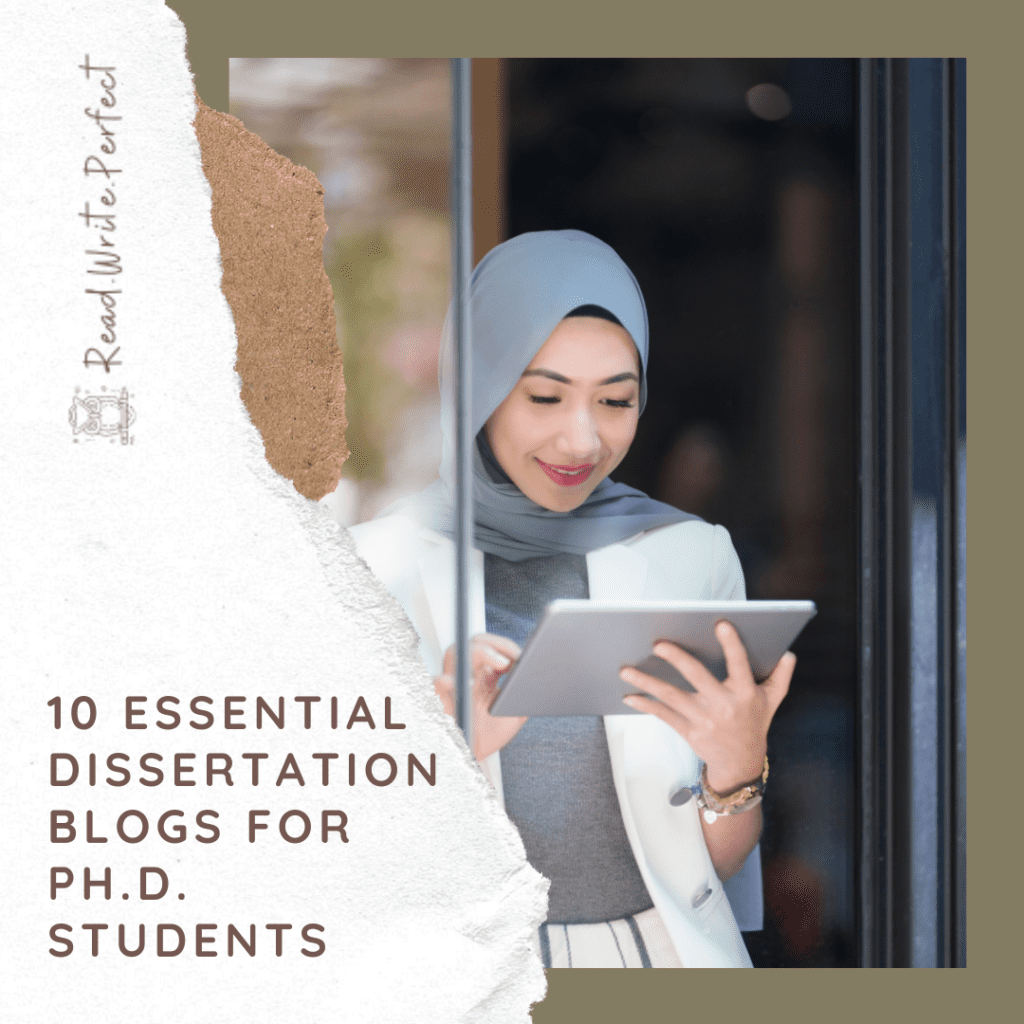
If you are anything like me, then having a few blogs and podcasts to follow is essential to every project – and dissertation blogs are no exception.
In this post, I’ll share ten of my favorite research blogs for dissertation students, including academic, writing, and humorous options. (Don’t worry – we’ll get to podcasts another day!)
Dissertation blogs are great, because you can get everything from instructional tips on research and writing to motivational daydreaming and validation for your frustrations. I think these ten blogs offer a good range of what you need to survive the dissertation research and writing process – but let me know what you think!
(And yes – the ReadWritePerfect Dissertation Advice blog also offers these things – but it’s nice to have options, right?)
The Thesis Whisperer
This blog offers ten years of humorous and supportive content from professor inger mewburn..
Director of Researcher Development at The Australian National University, Professor Mewburn writes The Thesis Whisperer with candor, humor, and more than a little bit of inside knowledge. her tips on writing, surviving the dissertation process, and staying motivated are user-friendly and filled with empathy.
Nick Hopwood
Associate professor at the university of technology, sydney, hopwood shares insight on research, academic work, writing, and more..
More formal and authoritative than the Thesis Whisperer, Nick Hopwood is a site for readers who prefer an all-business approach to academia. As well as the blogs, readers can find podcasts and instructional videos on the site.
Get a life, PhD
Although the last post was in 2021, this dissertation blog offers years of blogs on everything from how to find a life-work balance to general tips on academic writing..
Get A Life, PhD is all about finding the balance between letting your PhD fall to the wayside and letting your PhD consume you, mind, body, and soul. I especially love the practical, realistic tips on time management.
Research to Action
This collaborative site offers a synthesis of instructive blogging, online community, and academic debate, all focused on improving research strategies..
The Research to Action site is a pretty comprehensive one-stop-shop for researchers at all levels, from PhD candidate to seasoned researcher. The site itself is well-designed, as as well as instruction, readers can find reading lists, calls for submissions, and even job opportunities.
The Professor Is In
This dissertation blog offers guidance and resources for graduate students and academics from a range of contributors..
Slightly more commercial than some of the other blogs listed here, the key strength of The Professor is In lies in the range of contributors lending their voices and expertise to the content, from a productivity coach to a graduate director to an editor to several professors and assistant professors. Between them, they know everything there is to know about thriving in academia.
The Research Whisperer
This research blog is similar to the thesis whisperer, but more recent and more funding-focused..
The bloggers at The Research Whisperer address topics related to all aspects of academic research. While they “don’t just talk about funding,” there is a real emphasis in the content on the business side of research (such as getting grants and being a union member), as their tag line suggests: “Just like the Thesis Whisperer – but with more money.”
From PhD to Life
This dissertation blog covers topics that help phd students prepare for and transition into life after academia..
Even if you’re not quite ph(inishe)d yet, From PhD to Life will definitely give you something to look forward to – and tips to help you plan practically for it. I particularly like the light, conversational style – it’s a nice break from academia-speak.
Writing for Research
In this research blog, professor patrick dunleavy writes about academia, offering some higher-level insight into the processes and culture of higher education institutions..
Writing for Research does offer some basic writing and research advice, but what really helps it stand out from other sites is the focus on how academia ticks. There are posts on everything from university organization (why exactly is an academic discipline called a “discipline”?) to open-access and fair reviewing practices – really interesting stuff, in other words.
Tress Academic
Aimed at beginners and dedicated to simplifying things and getting you through the job, this site provides various resources for researchers and phd students..
Not every dissertation student is interested in a lifetime devotes to academia – some just want to get on and get done. Tress Academic offers easy-to-digest advice posts broken down into manageable steps, as well as useful worksheets, checklists, and free training videos. Again, this one has a commercial feel, but it’s still got a wealth of useful material if you need to get the job done quickly.
Supervising PhDs
This is a community research blog from various professors and academics. topics cover doctoral supervision relationships and pedagogies..
Admittedly, a lot of the really useful stuff on Supervising PhDs is aimed at professors and supervisors. However, there’s nothing to say you can’t gift some of the useful checklists, guides, and articles to your supervisor the next time they’re being particularly frustrating…
Need More Help?
Dissertation blogs and forums not your thing? Instead of relying on online communities, get personable and personalized help with dissertation coaching services .
Related Articles
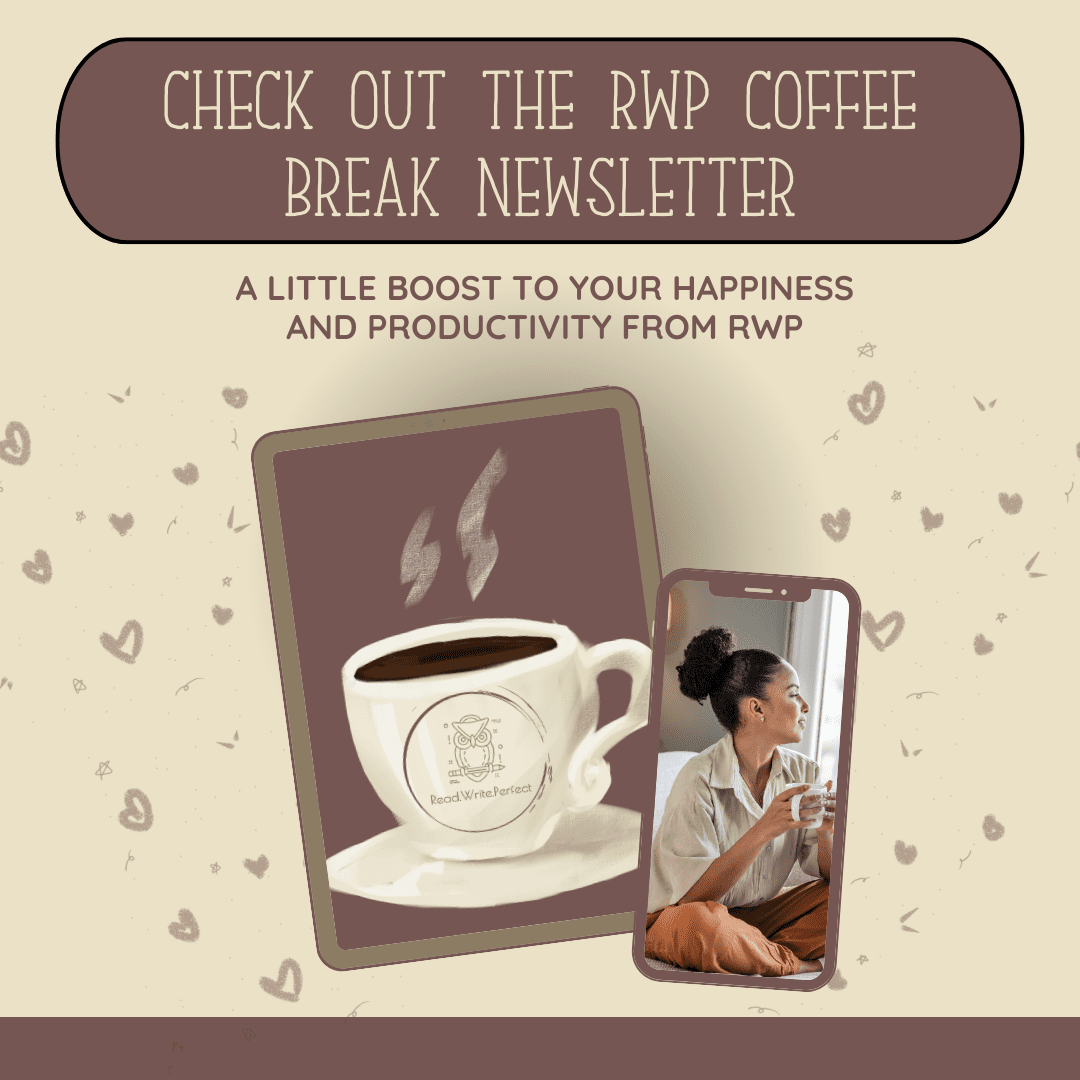
Dr. PhD Blog
Doctor of Philosophy in Blogging
Top 50 Blogs Every Graduate Student Should Read
by Linda on January 24, 2011
You might think the title for this article is a joke — after all, who has time to read extraneous writings during grad school ? But, you might be glad that you glanced through this list of the top 50 blogs every graduate student should read, and to bookmark a few of them for your sanity, for tools to help you study and stay tech-savvy , and for financial reasons. If nothing else, read Dr. Stearns’ modest advice to grad students and take it from there.
Grad Life Support
- GradShare : This blog is part of a community for graduate-level students to ask questions and to get expert advice.
- Graduate School : This About.com guide can help you decide whether or not to attend graduate school, what to expect and how to survive once you’ve enrolled.
- MakeUseOf : A great daily blog that features cool Web sites, computer tips, and downloads that make you more productive.
- PhDNet Blog – Your Online Graduate Student Community : A graduate school blog that offers advice for grad students.
- The College Puzzle : A college success blog by Dr. Michael W. Kirst at Stanford University.
- The Education Optimists : Learn about the power of society, schools, colleges and educators to empower individuals, further learning, and reduce inequities.
- Unclutterer : This is the adult’s blog for getting and staying organized.
- Zen Habits : Zen Habits is about clearing the clutter so you can focus on what’s important.
Specific Graduate Studies
- Benchfly : BenchFly was founded with a single desire: To increase the pace of scientific discovery. Although it is targeted at a scientific audience, the content covers a variety of topics relevant to general grad school life.
- Blog Them Out of the Stone Age : Winner of a few blogging awards over the years, Mark Grimsley, a professor of history at The Ohio State University, is a “sustained critic of academic military history.”
- Chemistry Grad Students & Postdocs Blog : Various grad students blog about their student experiences, so this blog is for more than chemistry majors.
- GPIA/Milano Grad School Blog : This blog’s four contributors come from GPIA (Graduate Program in International Affairs), Nonprofit Management, Organizational Change Management, and Urban Policy Analysis and Management.
- Greg Mankiw’s Blog : Mankiw is a professor of economics at Harvard University, where he teaches introductory economics (ec 10) among other courses.
- IIT JEE Physics : This blog is a platform of Physics for Engineering & Medical entrance examination like IITJEE, AIEEE, CBSE.
- MudPhudder : This blog may prove interesting to biological graduate students, medical students or anyone who is in academic medicine or biological research.
- NASSR Graduate Student Caucus Blog : Use this resource blog, designed for graduate students studying Romanticism.
- Poetry @ Princeton : This blog provides a clearinghouse for information about campus poetry events, and to provoke discussion, collaboration and general excitement about poetry through the “poem of the month” blog.
- Ramblings of a Graduate Student : This PhD student in the School of Meteorology (SoM) at the University of Oklahoma (OU) offers a detailed view of his weather so you can understand yours.
- Social Science Statistics Blog : This blog makes public the hallway conversations about social science statistical methods and analysis from the Institute for Quantitative Social Science and related research groups.
- UNL Political Science Graduate Student Blog : The University of Nebraska/Lincoln provides a resource for political science students located anywhere.
- Wharton MBA for Executives : A grad student writes about what it’s like to prepare and experience the Wharton West MBA for Executives program in the United States.
Grad Study Tools
- GearFire : Gearfire is a student productivity and organization blog, bringing you tips for academic success.
- Google Student Blog : This blog shows students how to get the most out of Google’s study tools.
- HackCollege : HackCollege is educating the students of the world about effective, open source software, putting techno-political arguments in everyday language, and creating a cult of “Students 2.0.”
- Leiter Reports: A Philosophy Blog : News and views about philosophy, the academic profession, academic freedom, intellectual culture…and a bit of poetry.
- ProfHacker : Although geared toward professors, this blog delivers tips, tutorials, and commentary on pedagogy, productivity, and technology in higher education.
- ProtoScholar : A “40-something” PhD student in education policy shares tips on productivity and on navigating the academic world.
- Stepcase Lifehack : Lifehacks describes any hacks, tips and tricks that get things done quickly by automating, increase productivity and organizing.
- Student Hacks : The purpose of this site is to provide you with the best online research tools, articles, and advice for succeeding in school.
- Study Hacks : The Study Hacks blog explores strategies for building a life that’s accomplished and engaging, but also relaxed and enjoyable to live.
Writing and Rhetoric
- Dissertation Research : This blog is about research, resources, reference, online expertise, writing and skill to support students in the fulfillment of their educational goals.
- Fragment/Framework : The purpose of this blog is to explore approaches to teaching composition and to richly and interactively reflect on the ideas, theories, and practices that shape rhetoric and composition studies.
- Kairosnews : Here you can see some of the first public discussions among rhetoricians about the scholarly value of academic blogging and other work with technology, as well as issues of intellectual property, copyright, and open source software as they relate to composition studies.
- Perfect Essay : This blog’s focus is on essays, from methodology to organization and conclusions.
- The Creative Writing MFA : A forum for applicants to graduate creative writing programs, but a great place to learn how to write professionally for any grad student.
- The Thesis Whisperer : The Thesis Whisperer is a ‘newspaper’ dedicated to the topic of doing a thesis.
- To Do: Dissertation : The goal of this blog is to talk realistically about practical steps that dissertation writers can take to finish their writing and take satisfaction and pride in their process and final product.
- WRT: Writer Response Theory : This is a blogging collective dedicated to the discussion and exploration of digital character art.
Work and Money
- Get Rich Slowly : This blog has to be one of the most down-to-earth personal finance blogs out there. Topics include grad school, post-grad and money juggling.
- Gradspot : This is the premier online destination for life after college for both undergrads and graduate students.
- Graduate Student Grant/Fellowship Blog : Although maintained for students at Division of the Humanities at the University of Chicago, this blog provides some great leads and links to sites you may have missed.
- Stay Out of School : This blog advocates critical thinking, creativity and teaching both in and out of the classroom.
- Student Branding Blog : The Student Branding Blog is the #1 resource for career and personal branding advice for high school, college and graduate students.
- Student Loan Network : Student Loan Network educates students on the best federal and alternative student loans and loan consolidation.
- TheMadGrad : This site focuses on the city of San Francisco, but also includes some general tips that can be used anywhere to find a job after grad school.
Tagged as: dissertation , Lifehacks , MFA , PhD student , Student hacks , The College Puzzle , thesis
Previous Post: 19 Doctorate Students Worth a Follow on Twitter
Next Post: 20 Google Chrome Extensions Every PhD Student Needs
About Our Blog
- Google Reader
Blog Archives
- November 2011
- September 2011
- January 2011
- November 2010
- December 2009
- November 2009
© 2024 Dr. PhD Blog. All Rights Reserved. | Privacy | Terms | Do Not Sell My Personal Information

Ten great blogs for PhD students
- June 28, 2012
- evalantsoght_uw8lmy
- Uncategorized
- 36 Comments
Since I started reading blogs at 6 months into my PhD program, I’ve gained some valuable insights from my favorite blogs. An exhaustive list would only lure you into getting more clutter into your information stream – so here are my 10 favorites (in no particular order)
1. Happy Science Cheek-in-tongue blog on science, social media, and pharma-research. If the thought of seeing your make-up under a microscope makes you giggle, don’t hesitate and head to Happy Science.
2. Peoplegogy This blog reads like a magazine, with a wide range of topics that I enjoy reading very much. You particularly might like the “Doctoral Confessions” series.
3. The Dutch PhD Coach I was planning to drop the link to Arjenne’s “Louter Promoveren” blog in Dutch when I discovered there is now an English offspring too. Great content – these articles might as well come from a book with advice on the PhD process.
4. Only a model A website and blog by a fellow PhD student in Structural Engineering. Interesting posts on finite element modeling, workflow processes and academic teaching.
5. Dr Sustainable Only about a month old, this blog has managed to provide some great content and a lively forum with comments. I have high expectations of seeing more interesting content coming up here.
6. Get a life, PhD Combining a career in academia with a family, and still finding time for yourself? I enjoy reading this blog while wondering how my future self will relate to these issues.
7. Gradhacker Life- and studyhacking for graduate students – with contributions from a large authorship.
8. Matt Might’s blog While the computer science in there is all Greek to me, the articles on graduate school and productivity are very much worth reading.
9. PhD2Published With a wealth of wisdom on academic writing in its archives, this blog also provides a Weekly Wisdom sections on Everything You Wanted to Know in Academia.
10. Thesis Whisperer We don’t need to introduce this one, right?
Do you use Slideshare already?If you answers this with "no",…
Silver Linings: Little Book of Contentment
If you have an extra hour this Sunday, read the…
Reverb10 – Day 27: Ordinary Joy
December 27 – Ordinary JoyOur most profound joy is often…
Thanks Eva!
Hi, nice list! some good additions to my reader. I'm fairly new to blogging as I'm a first year PhD student in child development/genetics and thought I would post on some of the things I learn along the way. It's probably not classed as one of the great blogs but feel free to check it out at: http://squirreledthoughts.wordpress.com/
Thanks for pointing me to your blog, Joanna!
Eva,Thanks for including my blog. I am humbled. I am always surprised that people actually read my blog, especially since my blog features such a \”buffet\” of content. Thanks again,Will
ooh thanks for the inclusion Eva!!
Apart from my own blog Next Scientist , which I think is awesome, I have compiled a list with great science blogs , some of which we share.
Thanks for sharing your links, Julio!
Thanks for these useful links:)
Also checkout sachristopher.wordpress.com
I love reading PhD blogs especially the first blog site hosted by a certain Happysci, Happy Science. And it's good to know that she just finished her PhD. Me? I'm just starting so it will still be a long way but I'll enjoy my time. http://www.collegepaper.org
Here is one on how to save money while doing a PhD: http://www.onefrugalscholar.blogspot.com
New, and I mean NEW to blogging–still figuring out blogger.com–that new. I'm also a new doctoral student–just started this month. I'd like so share my blog with others in the Education arena–I'm in education and don't want to bore anybody with the inside scoop on an education doctoral journey. If possible, post the reply, and I'll follow directions. Thanks.
Would you be interested in writing a guest post for PhD Talk on your doctoral journey?
Hope My Blog http://guruofmovie.blogspot.in Will Also Achieve This Milestone
Great post!!
Im intresting eve lansoght
Great post… I am fairly new to blogging as well, I began last month http://adamchehouri.blogspot.ca/ and find it amazing the impact a simple blog can have and the experience you gain from it.
I have developed a simulator in ns-2 for heterogeneous mobile and wireless networks that makes vertical handovers between wlan, wimax, umts according vertical handover decision algorithms. If some PhD student in the beginning phase is interested to research in this area this simulator is excellent for getting results and simulate different scenarios. Write me on [email protected] for any help.
Enjoyed this, thanks. Shameless plug – I have just started a blog on my recent transition from research to industry. Maybe I'll make your next top ten! http://drtipper.blogspot.co.uk/
This comment has been removed by the author.
I would like to introduce to you a new place where you can have full access to ways to increase the quality of your scientific artwork. keepcalmandpublishpapers.com keepcalmandpublishpapers.com is a new site that contains tutorials, guidelines and more. Whether you are a researcher, a student or just a science enthusiast, you may find resources for yourself. Please have a look and leave us any feedback on the new site at keepcalmandpublishpapers.com – and I hope you enjoy it.
Thanks for the list of blogs, Im half way through them so far so ive bookmarked this page A+
Good luck with the second half of your PhD!
I found your post when looking for Ph.D blogs similar to mine – I find it's really helpful to see what other Ph.D candidates are up to, to keep me motivated and inspire me to write more. Writing about my research, and life in general, actually pushes me to get more done. I'm just coming to the end of my first year, and hoping to continue blogging throughout my Ph.D journey.
Thanks for sharing this PhD. blog list. Some of them look really interesting.
Great List Eva, Thanks for sharing. I have also started blogging about career options after PhD on http://www.gradcompass.com . would be great to hear your views.
The documents are highly efficient and convenient to read. Reviews are one types of experience in custom essay writing . It describes and highlights the writer's piece of writing. In this reviews are expressing the value of something from the writer.
Great gift for PhD students! https://www.etsy.com/listing/491992296/seize-the-data-academic-mug-phd-gift-11?ref=shop_home_active_4
Hi everybody, I'm also a new doctoral student in technical field-just started this month. and I need some advices to start my research
Hi Azamat, welcome to reading my blog! Hope you find interesting information here.
Thanks for providing this helpful article.
Great list! This site might be helpful too for PhD students. Expontum ( https://www.expontum.com ) – Helps researchers quickly find knowledge gaps and identify what research projects have been completed before. Thanks!
Leave a Reply Cancel reply
Your email address will not be published. Required fields are marked *
Save my name, email, and website in this browser for the next time I comment.
- previous post: Giving a poster presentation for the first time
- next post: Who buys music anyway?
- Research and Publications
- Guest Posts
Free Templates for your Research
Sign up here to get access to worksheets for your research that help you have more efficient meetings, reflect on your work, and plan your month. Suitable for anyone from Master’s thesis students to full professors!
- BLOGGERS DATABASE
- SUBMIT YOUR BLOG
News Reader
Brand Monitoring
Blogger Outreach or Influencer Marketing
Combined Newsletters
Embeddable RSS Widgets
RSS Combiner beta
Select Page
- Get 250k Bloggers, Podcasters and Media outlets with email contacts. Export Full Database
- Request Bloggers Contacts
- Export Contact List
30 Best PhD Blogs and Websites
- The Thesis Whisperer
- Northeastern University PhD Education
- Raul Pacheco-Vega, PhD Blog
- FInd PhD Blogs
- The Professor Is In Blog
- Foster Blog » PhD
- IMISCOE | PhD Blog
- Get a Life, PhD
- PhD Assistance Blog
- Olga Degtyareva, PhD
- The Dutch PhD coach Blog
- Research Degree Insiders Blog
- A Happy PhD
- The Slow Academic
- How to Write a Phd in a Hundred Steps (or More) Blog
- The PhD Careers Blog
- PhD Academy Blog
- From PhD to Life Blog
- PhDStudent Blogs
- Finish Your Thesis Blog
- Hanna Erickson, MD, PHD Blog
- patter » starting the PhD
- Thrive PhD Blog
- How to PhD Blog
- Anuja Cabraal (PhD) Blog
- Adventures of a PhD
- Fearless Grad Blog
PhD Bloggers
- PhD Newsletter
Here are 30 Best PhD Blogs you should follow in 2024
1. The Thesis Whisperer

2. Northeastern University PhD Education

3. Raul Pacheco-Vega, PhD Blog

4. FInd PhD Blogs

5. The Professor Is In Blog

6. Foster Blog » PhD

7. IMISCOE | PhD Blog

8. Get a Life, PhD

9. iLovePhD

10. PhD Assistance Blog

11. PhD Life

12. Olga Degtyareva, PhD

13. The Dutch PhD coach Blog

14. Research Degree Insiders Blog

15. A Happy PhD

16. The Slow Academic

17. How to Write a Phd in a Hundred Steps (or More) Blog

18. The PhD Careers Blog

19. PhD Academy Blog

20. From PhD to Life Blog

21. PhDStudent Blogs

22. Finish Your Thesis Blog

23. Hanna Erickson, MD, PHD Blog

24. patter » starting the PhD

25. Thrive PhD Blog

26. How to PhD Blog

27. Anuja Cabraal (PhD) Blog

28. Adventures of a PhD

29. Fearless Grad Blog

Media Contact Database
Magazine newsletter.

2021-22 Graduate Student Blog Vision
Hello AMS Graduate Student Blog readers! I would first like to thank Caleb McWhorter and the previous writing team for their work and dedication to the success of the blog.
My name is Jasmine Camero and I am the new editor-in-chief for the AMS Graduate Student Blog. I am currently a Ph.D. student at Emory University with research interest in Algebraic Geometry. As a graduate student and a woman of color, one of my goals has been to create community among students so we can thrive in our studies and careers as well as in a social aspect. I would like this to be a space for productive dialogue about topics centered on the challenges students face while encouraging student success.
I cannot wait to start working with such a strong group of writers who have already volunteered their time to the blog with unique voices that can translate their thoughts, ideas, and experiences to other graduate students. I am confident they will provide readers with their special experiences, viewpoints, advice, and much more. To the writers: thank you in advance for your time, energy, and commitment to this blog. The team and I will work hard to provide a wide-ranging collection of articles for you.
My vision for the next year is to capture the unique and crucial experiences of graduate students on an academic, professional, social, and personal level. While doing so, I would like to emphasize the following topics:
- Diversity : Graduate students are more than just students. We come from a large variety of backgrounds: genders, races, ages, countries, orientations, and more. It is crucial that we not only acknowledge this, but also celebrate it. We would like to highlight the varying aspects of a graduate students adventures. This can include stories about the barriers members of underrepresented communities face and advice for overcoming them as well as encounters of first-generation students and their personal navigation through academia.
- Resources : Graduate students take on many roles: students, mentors/mentees, teachers, and researchers. We will discuss useful internet sources such as qualifying exam repositories, problem solving, or teaching material. We also plan to share helpful tips and tricks, advice, and specialized templates for beginner or advanced users with TeX.
- Experience : Experience itself is an unparalleled affair. It will be worthwhile to display the experiences of students in varying years of their programs: first year, second year, etc. This can include navigating exams, building a CV, finding an advisor, traveling to conferences, and being on the job market.
- Mental Health : For many, academia can be a very toxic environment. This can be a space for students to witness and create a healthy dialogue about mental health struggles.
- Professional Development : A graduate program in mathematics isn’t just about the mathematics. Graduate students engage in a variety of activities. We will work to highlight mathematicians engaged in spreading the access to mathematics to groups in or outside of their respective institutions. This may include information about organizing and running a seminar, Directed Reading Program (DRP), Math Circle, attending conferences, or volunteering experiences.
Apart from these central themes, the AMS Graduate Student Blog is by graduate students, for graduate students. We want to hear your ideas, stories, feedback, and suggestions for what you would like to see on the blog. Please contact me, [email protected] , or any of the other writers to suggest ideas. If you want to take it a step further, the best way to see the content you want is for you to contribute! If you are interest in writing for the blog, contact me.
I cannot wait to see what this year has in store for the AMS Graduate Student Blog .

About Jasmine Camero
Opinions expressed on these pages were the views of the writers and did not necessarily reflect the views and opinions of the American Mathematical Society.
- Search for:
- Academic Skills
- Algebraic Geometry
- Announcement
- Arts & Math
- Book Reviews
- Conferences
- Crossword Puzzles
- Editorial Statement
- First-generation
- Grad School
- Grad student advice
- Grad student life
- Linear Algebra
- Math Education
- Math History
- Math in Pop Culture
- Math Teaching
- Mathematicians
- Mathematics in Society
- Mathematics Online
- Number Theory
- Social Justice
- Starting Grad Schol
- staying organized
- Technology & Math
- Uncategorized
- Voting Theory
- December 2021
- November 2021
- October 2021
- September 2021
- January 2021
- November 2020
- February 2020
- January 2020
- December 2019
- November 2019
- October 2019
- September 2019
- August 2019
- November 2018
- September 2018
- February 2018
- January 2018
- December 2017
- November 2017
- October 2017
- September 2017
- August 2017
- February 2017
- January 2017
- December 2016
- November 2016
- October 2016
- September 2016
- August 2016
- February 2016
- January 2016
- December 2015
- November 2015
- October 2015
- September 2015
- January 2015
- December 2014
- November 2014
- October 2014
- September 2014
- August 2014
- February 2014
- January 2014
- December 2013
- November 2013
- October 2013
- September 2013
- August 2013
- February 2013
- January 2013
- December 2012
- November 2012
- October 2012
- September 2012
- August 2012
- February 2012
- January 2012
- December 2011
- November 2011
- October 2011
- September 2011
- August 2011
- February 2011
- January 2011
- December 2010
- November 2010
- October 2010
- September 2010
- August 2010
- February 2010
- January 2010
- December 2009
- November 2009
- October 2009
- September 2009
- August 2009
- February 2009
Retired Blogs
- A Mathematical Word
- inclusion/exclusion
- Living Proof
- On Teaching and Learning Mathematics
- PhD + epsilon
- Entries feed
- Comments feed
- WordPress.org
Grad 101 Blog
Friday, Apr. 5, 2024
By Carly Graverson
By Fernanda Morales-Calva
Technology is your friend. Take maximum advantage of it during your graduate studies!
Tuesday, Mar. 5, 2024
By Bohan Zhang, PhD Student in History
Monday, Feb. 26, 2024
By Bohan Zhang, Ph.D. Student in the Department of History
Wednesday, Feb. 7, 2024
By Fariha Ahmad. Preparing to give a presentation at a conference can be intimidating the first time you do it. Here are some personal experiences from my first conference!
Thursday, Jan. 25, 2024
By Cam Zapater. Designed to positively impact the community, these awards range from $2,000 to $6,000.
By Cam Zapater. The awards vary from $2,000 to $5,000 and will provide funding for research abroad.
Tuesday, Jan. 23, 2024
By Manuel Carmona Pichardo. The pedestrian guide to surviving and thriving in Houston without a car of your own.
By Carly Graverson. Carly interviews David Solti, a recent Rice graduate, about his job as a flight controller at NASA.
Friday, Jan. 12, 2024
By Sathvik Ajay Iyengar (PhD Fellow in Materials Science and NanoEngineering [MSNE])

20 Amazing Websites and/or Resources For PhD Students
“The Web is full of essential as well as scrap websites and tools. The difficult task for students is to find the important one, without compromising their personal, professional and research information. I’m giving you a list of essential websites and resources for researchers and PhDs.”
PhDs have comprehensive knowledge on a specific topic or field. Oftentimes, when they search for lucrative websites or resources; most of the time, they land on either scrap websites or nothing important.
They want to make their PhD life easy using tools, websites or resources, but publishers trick them to see lists that are either for PhD programs , scholarship programs or something else. I personally find it difficult while doing research for this article.
The second thing is, they lack knowledge about where they can find useful resources. However, there are certain websites that make your life easier if you know about it in your early life of PhD.
You may have to search literature, find information, gain knowledge, write articles, publish papers, and prepare images, charts or interactives. For all such tasks, you have to use different websites or tools.
I have divided this article into three parts. In this part, we will discuss only websites and resources while in the upcoming two parts, we will discuss important tools and apps. So here are 20 amazing websites or resources for PhD students.
Google Scholar
Google books , science direct, biomed central, microsoft academic, science.gov, pubmed central, digital commons network, diagrams.net.
- Wrapping up:
20 Amazing Websites and/or Resources For PhD Students
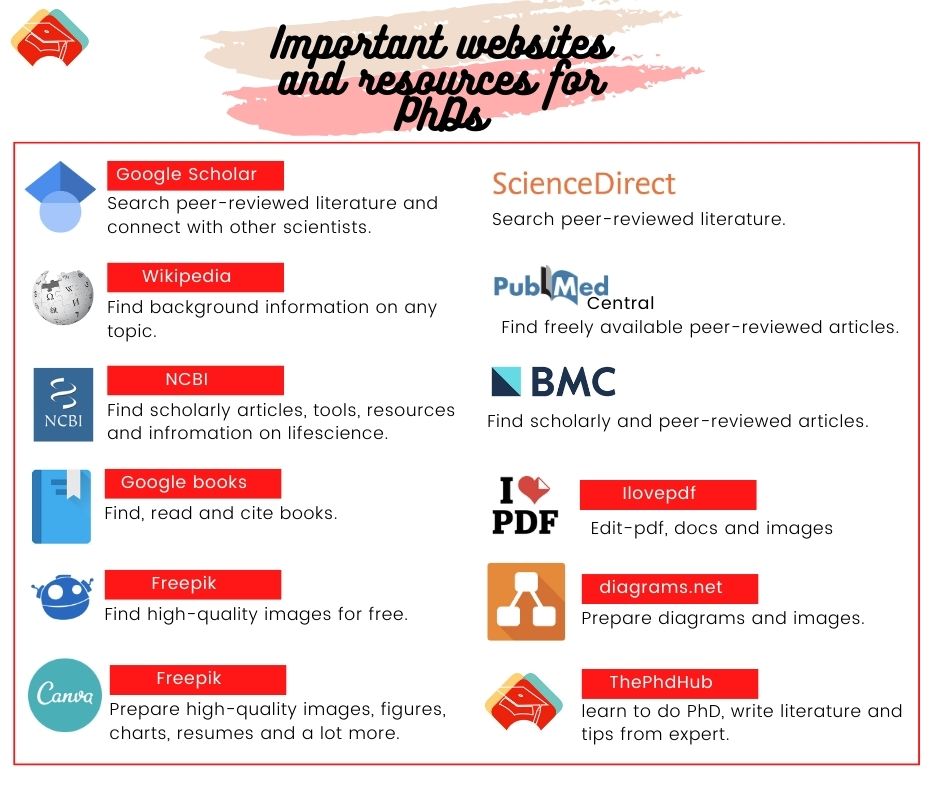
- Website link: https://scholar.google.com/
- Application: Find scholarly articles and connect with other scientists.
At the very beginning, researchers should know about Google Scholar. It’s a search engine dedicatedly prepared for research students and scientists. What can you do with it?
- You can find peer-reviewed articles
- Make your own profile
- Upload your publications
- Save and share articles
- Check your citations matrics
- Connect with other scientists
Google Scholar is Google’s product, safe to use and easy to navigate. I have already written an article on this topic, you can read: 7 Ways to Find Peer-Reviewed Articles On Google .
- Website link: https://books.google.com/
- Applications: To find peer-reviewed Books.
Yet another impressive product from Google is Google Books. It comes up with a simpler and more impressive look, type a topic name on which you want a book in Google books and you get thousands of options.
When you click the book, you get information like:
- ISBN number
- Name of the publisher
- Number of pages
- Other editions
- Name of authors
- Keywords
- The availability of the book on other platforms
Most importantly, we can generate citations there and use them in our thesis or paper directly. I know there are many sources available to purchase books but Google Books is the most trusted, authentic and viable option for PhDs.
- Website link: https://www.wikipedia.org/
- Application: To find resources and information.
There’s a misconception among research students that Wikipedia isn’t a trusted source to find literature. Let me tell you that, it’s partially true, how? First, it is the best place where you can get any information regarding any topic.
Wikipedia gives amazing background information regarding any topic and is too peer-reviewed. On the other hand, it’s difficult to understand basic concepts from research papers, directly. So, students have to start with Wikipedia.
Search anything on the Wikipedia search engine, read it and understand the concept. From my personal experience, Wiki makes concepts easier to understand.
- Website link: https://www.sciencedirect.com/
- Application: Find peer-reviewed resources across the web.
(We are almost going in sync).
When you type any topic into Google you will get two topmost results, one is from Wikipedia and the second is from Science Direct, mostly.
ScienceDirect is a great place to find peer-reviewed scientific literature. The best thing about this website is, when you open it, it shows results as a “compilation” of abstracts for a topic. You just have to quickly read it, click the paper you want and go there.
It makes the reading task so easy. The target audience for this website is students from various fields of science as well as scientists.
- Website link: https://www.ncbi.nlm.nih.gov/
- Application: find resources, tools, data, and information for biotechnology.
The full name of NCBI is National Centre for Biotechnology Information and is run by the NIH- National Library of Medicine. Any life science student should know about the NCBI from day one of their research.
It’s a huge database for life science. It contains
- Resources
- Methods
- Portals to submit data.
Researchers can submit their data to NCBI and make them accessible to other scientists. Keep in mind that the data and other information present there on NCBI are sensitive. You can get information about any organism and anything associated with that organism.
NCBI is a huge portal, students have to learn to use various tools and information present there.
- Website: https://www.biomedcentral.com/
- Application: Search for scholarly literature.
Biomed central is yet another website to find scholarly literature and peer-reviewed articles. It’s a part of Springer-Nature and provides high-quality journals, resources and literature for peers and scientists.
Moreover, you can explore journals from various fields and get published there. Biomed Central is yet another resource like Science Direct.
- Website: https://www.microsoft.com/en-us/research/project/academic/
- Application: Find resources related to your topic.
Microsoft Academia is a search engine from Microsoft. It not only provides peer-reviewed articles but also news, blog posts, videos and even podcasts on one page. Meaning, you can remain updated with your subject or topic.
Notedly, it’s not the platform to find scholarly articles, but you can get ‘around’ the information on your topic. So you can know what’s going on around your topic.
- Website: https://www.science.gov/
- Application: Provides various forms of information.
Before writing this article, I didn’t know about science.gov. It’s a kind of semi-search engine from the US government science information. Interestingly, it gives us information categorized into- text, multimedia, data and public access.
I don’t know how you will use it, but it’s definitely helpful to research students. I will learn it, use it and come back to you; if it would be helpful. Give it a fair try.
- Website: https://www.ncbi.nlm.nih.gov/pmc/
- Application: Search full-text article.
PMC- PubMed Central is an important website for PhD students as it provides free full-text articles available on your topic. It has the largest number of article databases that students can explore. Not only that, students can download articles, generate citations and search related queries.
PMC and NCBI are two websites that every science, biology and life science student has to know.
- Website link: https://www.jstor.org/
- Application: find knowledge, resources and information.
JSTOR is a non-profitable organization that provides information in various fields. It’s also a type of search engine for scientific literature. Students can find primary resources, literature, images, journals and even books.
You can find information on your topic in one place, but the amazing feature that it has is the ‘images’. A dedicated images feature of JASTOR shows thousands of images for your topic from various resources which are sometimes not present on Google Images.
- Website: https://network.bepress.com/
- Application: Find literature and resources.
Yet another search engine to find various research is the Digital Commons Network. I didn’t find anything ‘out-of-the-box’ for this website. You can give it a try.
Now besides finding literature, there are other things students also have to do during PhD, for example, preparing diagrams, generating citations or editing Pdfs. Here is a list of some more tools that help you with this.
- Website: https://app.diagrams.net/
- Application: make diagrams, photos, flowcharts and images.
Diagrams.net is an online website that helps you in preparing diagrams, charts, flowcharts, images and other multimedia for your thesis or research. I am planning to prepare one tutorial for this. And if possible I will upload it here. So that you know how to use it.
- Website: https://www.ilovepdf.com/
- Application: edit– pdf, doc or text.
Ilovepdf is my personal favorite website. Let me tell you that we can do so many things that usually you can’t do. It’s a specialized website that can help you with your doc. You can convert your docs, for example,
- Excel to pdf
- Html to pdf
- And vice versa.
You can compress doc or pdfs, split it, merge it and edit them. You can even edit your final thesis draft in the form of a pdf. You can even add a page or delete one or edit some part of the text. Isn’t it amazing! I strongly recommend using ilovepdf.
- Website: https://www.freepik.com/
- Application: Download high-quality images for free.
Now, you need images, illustrations and gifs for your presentations and other work during your PhD. But finding copyright-free images is a hard task. Freepik is one such website, from where you can download images for free.
The images in the freepik database are high-quality and freely available. You can use it and make your presentation more impressive.
- Website: https://www.canva.com/
- Application: To prepare interactives.
Yet another great place to prepare images, figures, tables, datasheets and many other interactives for your thesis is Canva.
Canva is super easy to use and has many templates for doing so many things. You can do
- Presentation
And a lot more. I strongly recommend visiting Canva once.
Wrapping up:
I know these are not 20, but timely I will add more websites to this list and complete it. The reason is, I want to give a useful and beneficial list not a list with repetitive and unuseful things. One more thing I want to add, these websites are free to use.
I hope this article will help you. Do share this content in your research group and bookmark the page. Still, then you can read this article to learn more: 7 Must-Have Thesis Writing Tools .

Dr. Tushar Chauhan is a Scientist, Blogger and Scientific-writer. He has completed PhD in Genetics. Dr. Chauhan is a PhD coach and tutor.
Share this:

- Share on Facebook
- Share on Twitter
- Share on Pinterest
- Share on Linkedin
- Share via Email
About The Author

Dr Tushar Chauhan
Related posts.

Why is it called a Doctor of Philosophy?

Preparing for a PhD Viva
Leave a comment cancel reply.
Your email address will not be published. Required fields are marked *
Save my name, email, and website in this browser for the next time I comment.
Notify me of follow-up comments by email.
Notify me of new posts by email.

Community Blog
Keep up-to-date on postgraduate related issues with our quick reads written by students, postdocs, professors and industry leaders.

Don’t Let Research Overwhelm You: Writing Habits that Work
There’s no doubt about it – writing can be difficult. Whether you’re writing the first sentence of a paper or a grant proposal, it’s easy

You’re Not Alone: Here’s How to Cope With Impostor Syndrome
Impostor Syndrome is a common phenomenon amongst PhD students, leading to self-doubt and fear of being exposed as a “fraud”. How can we overcome these feelings?

5 Ways to Combat PhD Stress
PhD stress is real. Learn how to combat it with these 5 tips.

Using Reference Management Software
Reference management software solutions offer a powerful way for you to track and manage your academic references. Read our blog post to learn more about what they are and how to use them.

Ending the Procrastination Trap
Are you always finding yourself working on sections of your research tasks right up until your deadlines? Are you still finding yourself distracted the moment

Do you need to have published papers to do a PhD?
Do you need to have published papers to do a PhD? The simple answer is no but it could benefit your application if you can.

What is an Academic Transcript?
An academic transcript gives a breakdown of each module you studied for your degree and the mark that you were awarded.
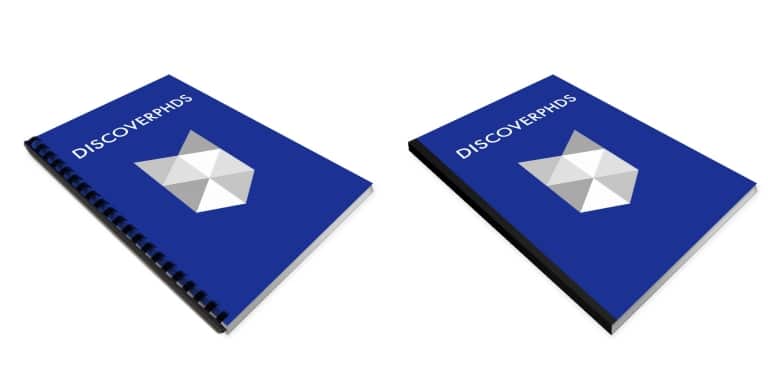
Thesis binding and printing options
Find out the different dissertation and thesis binding options, which is best, advantages and disadvantages, typical costs, popular services and more.

What is the Thurstone Scale?
The Thurstone Scale is used to quantify the attitudes of people being surveyed, using a format of ‘agree-disagree’ statements.

Annotated Bibliography vs Literature Review
Find out the differences between a Literature Review and an Annotated Bibliography, whey they should be used and how to write them.

How do you Write the Rationale for Research?
The term rationale of research means the reason for performing the research study in question.

What is a Monotonic Relationship?
The term monotonic relationship is a statistical definition that is used to describe the link between two variables.

What is a Research Instrument?
The term research instrument refers to any tool that you may use to collect, measure and analyse research data.

What is the Difference between In Review and Under Review?
This post explains the difference between the journal paper status of In Review and Under Review.

What is an In Press Article?
An In Press article is a paper that has been accepted for publication and is being prepared for print.

Are Elements Capitalized?
When you should and shouldn’t capitalise the names of chemical compounds and their abbreviations is not always clear.

The Unit of Analysis Explained
The unit of analysis refers to the main parameter that you’re investigating in your research project or study.

Types of Research – Explained with Examples
There are various types of research that are classified by objective, depth of study, analysed data and the time required to study the phenomenon etc.
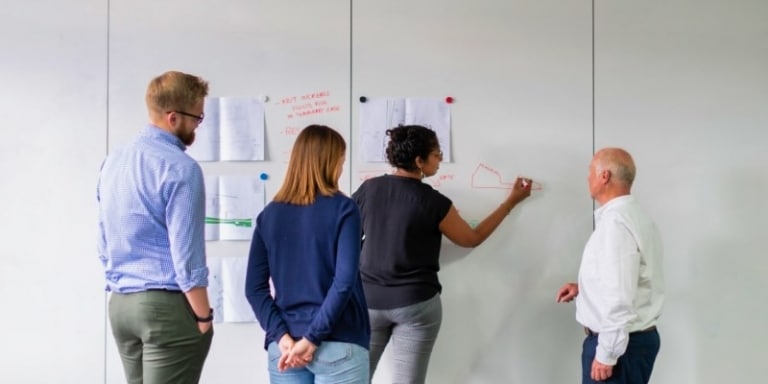
Scope and Delimitations – Explained & Example
The scope and delimitations of a thesis, dissertation or paper define the topic and boundaries of a research problem – learn how to form them.

What is Self-Plagiarism, What is the Impact and How do you Avoid It?
Self-plagiarism is when you try and pass off work that you’ve previously done as something that is completely new.

How to Write the List of Figures for a Thesis or Dissertation
This post explains where and how to write the list of figures in your thesis or dissertation.

How to Write a Figure Legend
A well written figure legend will explain exactly what a figure means without having to refer to the main text. Our guide explains how to write one.

Multistage Sampling
Multistage sampling is a more complex form of cluster sampling for obtaining sample populations. Learn their pros and cons and how to undertake them.

List of Abbreviations for a Thesis or Dissertation
Need to write a list of abbreviations for a thesis or dissertation? Read our post to find out where they go, what to include and how to format them.

What is Research? – Purpose of Research
The purpose of research is to enhance society by advancing knowledge through developing scientific theories, concepts and ideas – find out more on what this involves.

Statistical Treatment of Data – Explained & Example
Statistical treatment of data is essential for all researchers, regardless of whether you’re a biologist, computer scientist or psychologist, but what exactly is it?

Abstract vs Introduction – Differences Explained
An abstract and introduction are the first two sections of your paper or thesis. This guide explains the differences between them and how to write them.

What is a Science Investigatory Project?
A science investigatory project is a science-based research project or study that is performed by school children in a classroom, exhibition or science fair.

What is a Concept Paper and How do You Write One?
A concept paper is a short document written by a researcher before starting their research project, explaining what the study is about, why it is needed and the methods that will be used.

How to Format a PhD Synopsis (India)
This article will answer common questions about the PhD synopsis, give guidance on how to write one, and provide my thoughts on samples.

How to Write the Scope of the Study
The scope of the study is defined at the start of the study. It is used by researchers to set the boundaries and limitations within which the research study will be performed.

What is the Significance of the Study?
In this post you’ll learn what the significance of the study means, why it’s important, where and how to write one in your paper or thesis with an example.

Questions to Ask During Your PhD Interview
This post gives you the best questions to ask at a PhD interview, to help you work out if your potential supervisor and lab is a good fit for you.
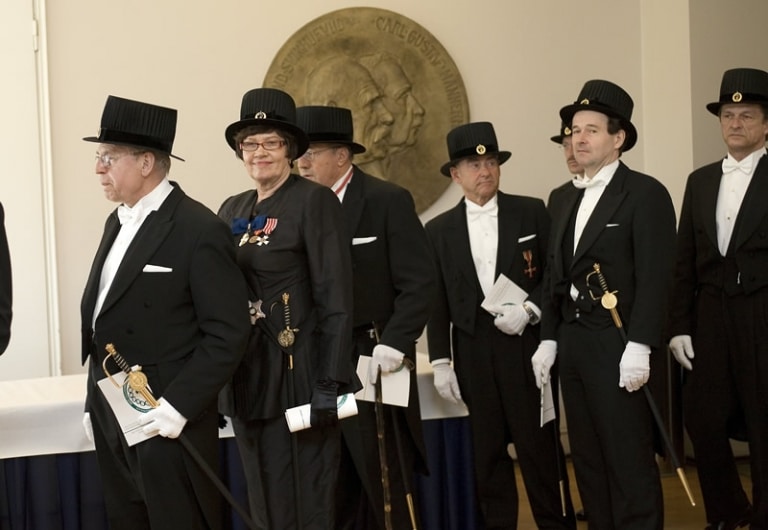
Finland’s PhD Sword and Hat Tradition
In Finland, all new PhD holders are given a traditional Doctoral Hat and Doctoral Sword during a Conferment Ceremony, symbolising the freedom of research.

5 Things to Consider Before Doing a PhD While Working
Is it really possible to do a PhD while working? The answer is ‘yes’, but it comes with several ‘buts’. Read our post to find out if it’s for you.

What Should You Call a Professor?
You’ll come across many academics with PhD, some using the title of Doctor and others using Professor. This blog post helps you understand the differences.

What’s the Difference between a Dissertation and a Thesis
In the UK, a dissertation, usually around 20,000 words is written by undergraduate and Master’s students, whilst a thesis, around 80,000 words, is written as part of a PhD.

Academic Conferences are Expensive. Are they really worth it?
Academic conferences are expensive and it can be tough finding the funds to go; this naturally leads to the question of are academic conferences worth it?

What Is The Age Limit for A PhD?
The answer is simple: there is no age limit for doing a PhD; in fact, the oldest known person to have gained a PhD in the UK was 95 years old.

The MBA vs PhD Debate
Considering whether to do an MBA or a PhD? If so, find out what their differences are, and more importantly, which one is better suited for you.

Thesis and Dissertation Appendicies – What to Include
A thesis and dissertation appendix contains additional information which supports your main arguments. Find out what they should include and how to format them.

The Dissertation Title Page
The title page of your dissertation or thesis conveys all the essential details about your project. This guide helps you format it in the correct way.

What Makes A Good PhD Supervisor?
Choosing a good PhD supervisor will be paramount to your success as a PhD student, but what qualities should you be looking for? Read our post to find out.

7 Tips for New Graduate Teaching Assistants
Being a new graduate teaching assistant can be a scary but rewarding undertaking – our 7 tips will help make your teaching journey as smooth as possible.

10 Ways to Impress a PhD Supervisor
Learn 10 ways to impress a PhD supervisor for increasing your chances of securing a project, developing a great working relationship and more.
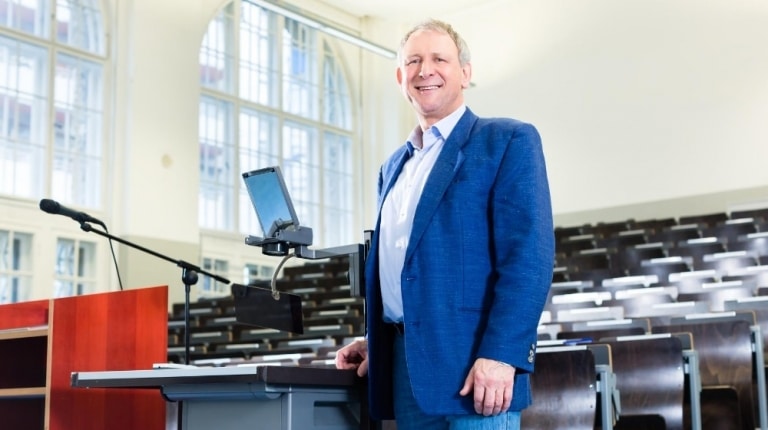
What Is Tenure Track?
Tenure is a permanent position awarded to professors showing excellence in research and teaching. Find out more about the competitive position!

The Power of Body Language in PhD Interviews
You’ve impressed the supervisor with your PhD application, now it’s time to ace your interview with these powerful body language tips.

How to Build a Research Collaboration
Learning how to effectively collaborate with others is an important skill for anyone in academia to develop.
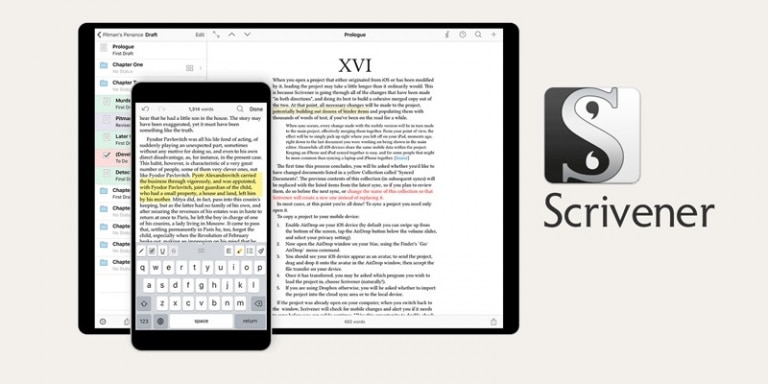
Using Scrivener for PhD Thesis & Dissertations
Find out how you can use Scrivener for PhD Thesis & Dissertation writing to streamline your workflow and make academic writing fun again!

What is Scientific Misconduct?
Scientific misconduct can be described as a deviation from the accepted standards of scientific research, study and publication ethics.

8 Tips for Surviving Fieldwork
Fieldwork can be essential for your PhD project. Use these tips to help maximise site productivity and reduce your research time by a few weeks.

Covid-19 Guidance For Current And Prospective PhD Students
Stay up to date with current information being provided by the UK Government and Universities about the impact of the global pandemic on PhD research studies.

Using Technology to Increase Academic Productivity
Learn more about using cloud storage effectively, video conferencing calling, good note-taking solutions and online calendar and task management options.

Working from Home as A Research Student
Learn about defining your workspace, having a list of daily tasks and using technology to stay connected, all whilst working from home as a research student.


5 Tips for Preparing for Your PhD Viva
If you’re about to sit your PhD viva, make sure you don’t miss out on these 5 great tips to help you prepare.

5 Tips for A New PhD Student
Starting your PhD can feel like a daunting, exciting and special time. They’ll be so much to think about – here are a few tips to help you get started.

A Guide to Your First Week as A PhD Student
How should you spend your first week as a PhD student? Here’s are 7 steps to help you get started on your journey.
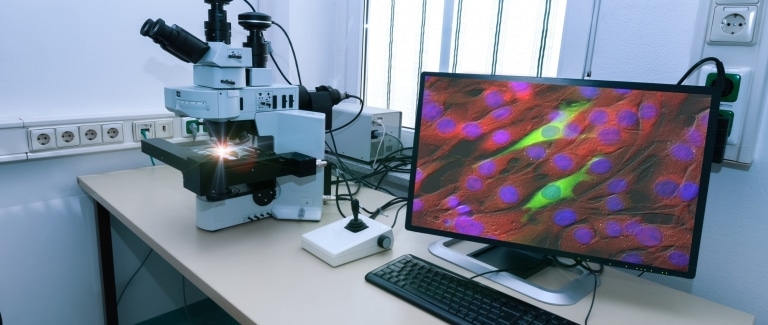
4 Tips for Applying to a PhD
Thinking about applying to a PhD? Then don’t miss out on these 4 tips on how to best prepare your application.
Gain valuable insight from our collection of exclusive interviews with both current and past PhD students. Learn from their best advice, personal challenges and career path after completing their doctorate.
Suggestions or feedback?
MIT News | Massachusetts Institute of Technology
- Machine learning
- Social justice
- Black holes
- Classes and programs
Departments
- Aeronautics and Astronautics
- Brain and Cognitive Sciences
- Architecture
- Political Science
- Mechanical Engineering
Centers, Labs, & Programs
- Abdul Latif Jameel Poverty Action Lab (J-PAL)
- Picower Institute for Learning and Memory
- Lincoln Laboratory
- School of Architecture + Planning
- School of Engineering
- School of Humanities, Arts, and Social Sciences
- Sloan School of Management
- School of Science
- MIT Schwarzman College of Computing
Student perspectives on grad life at MIT
Press contact :.
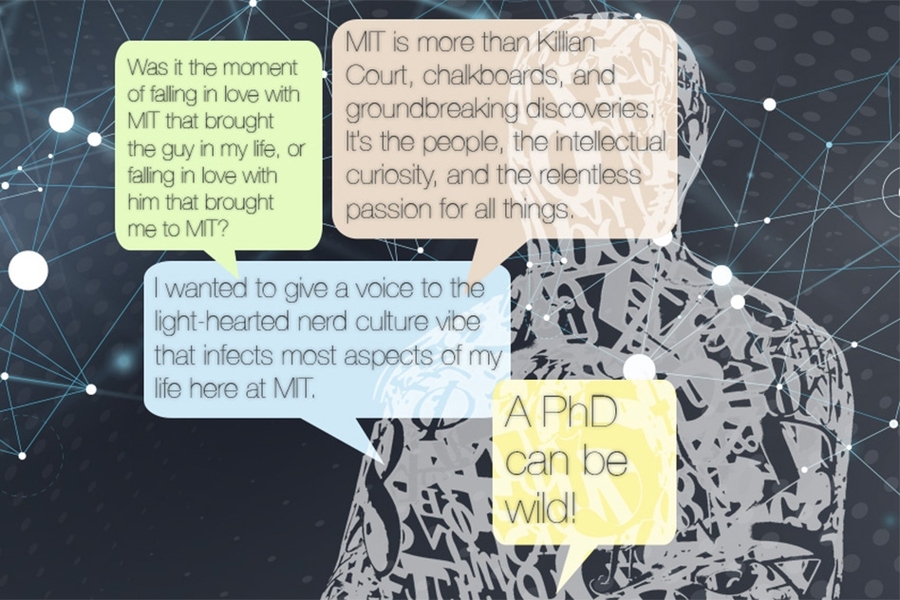
Previous image Next image
Being a graduate student at MIT is … well, it depends whom you ask. With more than 6,000 grad students enrolled in one of 32 doctoral or 27 master’s programs on campus, the variety of experiences (and opinions about those experiences) ranges wildly.
The Office of the Dean for Graduate Education (ODGE) has launched a new blog written entirely by current graduate students that tries to capture some of this variety. It is an eclectic mix of stories that offers readers a glimpse inside the MIT graduate community.
From inspiring overviews (“MIT is more than Killian Court, chalkboards, and groundbreaking discoveries. It’s the people, the intellectual curiosity, and the relentless passion for all things.”) to in-the-weeds pointers about campus life (“If there is an event, and if I’m on the fence about attending, it will come down to the food. … it can be a bonus on top of a talk by a Nobel laureate.”) to deeply personal revelations (“Honestly, I was scared to ask for help.”) — the blogs are written by students from all five schools at MIT and reflect a deeply varied range of origins, perspectives, and interests.
Modeled on the very popular (and irreverent) MIT undergraduate admissions blog , which features the musings of undergraduate students, the graduate student blog arose out of a partnership between ODGE, the School of Engineering, and the SoE Communications Lab. More than 100 students applied to participate in a one-week Independent Activities Period workshop on blog writing, which featured talks from dean of engineering Professor Ian Waitz, undergraduate admissions guru Chris Peterson, and Knight Science Journalism at MIT Director Deborah Blum. The 40 students the workshop worked in small groups with communications staff from all over MIT, and 30 of them completed the entries that just went live. Like the undergraduate blog, the new one publishes its submissions under a first-name-last-initial byline to inspire candid expression in its contributors.
One blogger, Dishita T., a graduate student in architecture, says she welcomed the opportunity to share a personal story that might resonate with others. Her piece, “To MIT With Love,” tells of falling in love: the first date in India, the cultural obstacles, and the ways in which a shared passion for MIT created a haven for the couple in Cambridge.
In her entry, Dishita asks: “Was it the moment of falling in love with MIT that brought the guy in my life, or falling in love with him that brought me to MIT?” Not only does MIT change the world at large, it also changes the people here in deep and personal ways, she says. And those tales are worth telling. “Whenever I hear those stories, I’m inspired.”
Because this is MIT, the graduate student blog is also a home for the offbeat. As Daniel G., a graduate student in the Department of Electrical Engineering and Computer Science, says: “I wanted to give a voice to the light-hearted nerd-culture vibe that infects most aspects of my life here at MIT, and which I quite enjoy.” In his blog post, Daniel describes explaining his chosen field to those outside of it. When he tells people he’s a theoretical computer scientist, he writes, they sometimes ask: “What does that even mean?”
Daniel describes three flavors of computer scientists: cryptographers, algorithmists, and complexity theorists. “There is a drawback to being a cryptographer,” he writes. “I imagine it’s the same sort of drawback the Hulk would experience in an anger management class. Much like the Hulk can't control his impulse for aggression, the cryptographer can't help but deal in secrets.”
After similar treatments of algorithmists (“in their pursuit for algorithmic nirvana, they have inadvertently forgotten the English language”) and the complexity theorists (“they are like your drunk uncle telling you that your life will never amount to anything”), Daniel wraps up with: “Shhh. You are now part of a secret academic cabal. Welcome to the great conspiracy.”
In the end, the graduate student blog is about opening minds and drawing readers into a research community that is special in ways impossible to quantify. “A PhD can be wild,” says blogger and computer scientist Irene C. Her piece, “My Road to Yelp Elite,” catalogues her comic quest to dine at 180 restaurants, review them for the online ratings website, and, at a good clip, gain Yelp Elite status. (“Whereas I should be asking: interpretable natural language models talk vs. a mentorship lunch for women in computer science? I find myself asking instead: Do I want free Brazilian BBQ or free Indian curry?” she writes.)
Irene tells readers she chased the Yelp Elite moniker as “an escape from the all-consuming life of a PhD student: If I couldn’t figure out how to model the error of a Bayesian network relating medical diseases and symptoms, at least another Yelper had just complimented me on my review of The Friendly Toast.”
About the Graduate Student Blog, Irene says she is excited to contribute to the range of narratives at MIT. “Part of staying sane is finding what makes you come alive and following that — through research and beyond.”
Share this news article on:
Related links.
- Graduate admissions blog
- Undergraduate admissions blog
- Office of the Dean of Graduate Education
- MIT Communications Lab
Related Topics
- Student life
- Graduate, postdoctoral
- MIT Sloan School of Management
- School of Architecture and Planning
- Independent Activities Period
Related Articles
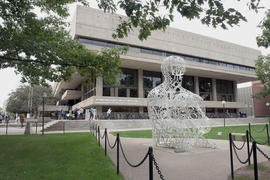
MIT graduate programs earn top marks from US News

Undergraduate Admissions Office celebrates 10 years of student blogging
Previous item Next item
More MIT News
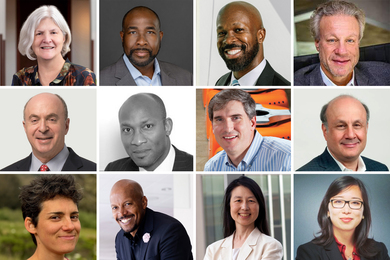
MIT Corporation elects 10 term members, two life members
Read full story →
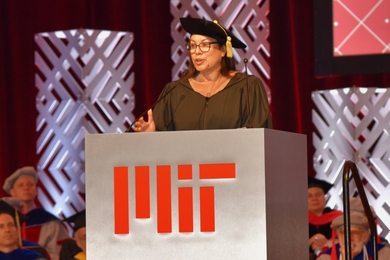
Diane Hoskins ’79: How going off-track can lead new SA+P graduates to become integrators of ideas
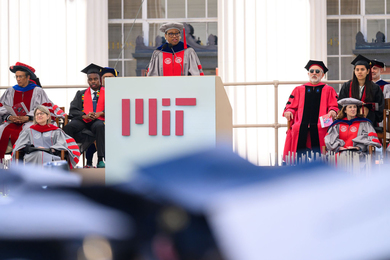
Chancellor Melissa Nobles’ address to MIT’s undergraduate Class of 2024
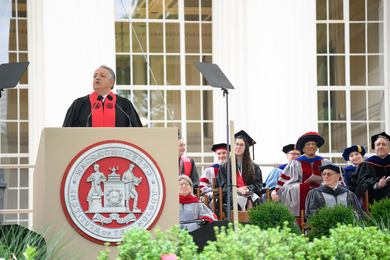
Noubar Afeyan PhD ’87 gives new MIT graduates a special assignment
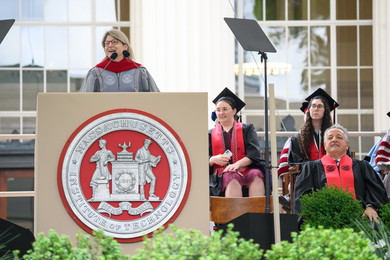
President Sally Kornbluth’s charge to the Class of 2024
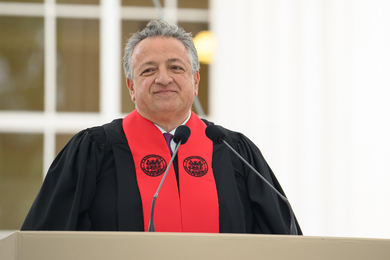
Commencement address by Noubar Afeyan PhD ’87
- More news on MIT News homepage →
Massachusetts Institute of Technology 77 Massachusetts Avenue, Cambridge, MA, USA
- Map (opens in new window)
- Events (opens in new window)
- People (opens in new window)
- Careers (opens in new window)
- Accessibility
- Social Media Hub
- MIT on Facebook
- MIT on YouTube
- MIT on Instagram
PhDLife Blog
Sharing PhD experiences across the University of Warwick and beyond
Why You Can’t Miss This Year’s Festival of Postgraduate Research

Hey there, fellow PhD researchers! Are you ready to dive into a day filled with interdisciplinary inspiration, networking, and maybe lots of fun and joy as well? I'm Yvette, a third-year PhD student in Applied Linguistics. I was one of the organisers of last year’s festival and I’m excited to see the festival launched again.... Continue Reading →
Working as a teaching assistant

To gain some valuable teaching experience in higher education institutions in the UK, most doctoral students will choose to be teaching assistants (GTA). I am one of them. This blog is about my personal experience of being a teaching assistant and some tips on this role. By Ivy Zhuo Overall, I have contributed to the... Continue Reading →
Writing-Up Diaries: The Final Push

Since her last instalment in November, Ellie is on her final push to the end of the thesis road. Read about what she’s been getting up to below. By Ellie King Since I last published a blog, it feels like my thesis has come on leaps and bounds and that I am, dare I say... Continue Reading →
It’s not about the thesis, it’s about you

The process of achieving a PhD can represent different things for different people. In this week’s blog, Riss shares their thoughts on what connects these different meanings and what achieving a PhD means to her. By Riss Muller. Having hit the midway point of my PhD, I’ve found myself reflecting on how my PhD experience... Continue Reading →
Writing a book review

Many doctoral students, like me, start their publications with a book review. However, this is not to say that a book review is easy or requires no skills at all. Instead, it plays a vital role in training our skills in academic writing and boosting our confidence in academic publications. In this blog, Ivy shares... Continue Reading →
Planning 101: How to Make Your Plans Work

Have you ever started a new planner, but then abandoned it for good? Maybe you’ve never planned anything, but suddenly want to try? In any case, Daria has some tips and tricks about finding the best ways to organise your daily life without pressure. By Daria Akhapkina Goal First and foremost, you need to know... Continue Reading →
Tough Grass: Grounding through Nature

Grounding has become a buzzword in wellbeing talks, but what exactly does it mean and how can it help you personally? In this week’s blog, Daria talks about finding peace and power in nature. By Daria Akhapkina The end of the term is approaching, the days get darker, the deadlines get tighter, and the stress... Continue Reading →
Writing-Up Diaries: November

Following on from her previous posts, blog editor Ellie documents her writing up journey for November. By Ellie King. I can’t believe I’m already writing about November. I know we say it every year, but this year has really gone quickly. It feels only yesterday that I was starting to write my thesis back in... Continue Reading →
Handling Rejection as a PhD Student

The PhD experience can often be full of rejection. Rejection for funding, rejection from conferences, rejection from academic journals. Today Iona explores how rejection can be understood from a developmental perspective by looking at attachment theory and how this can then be applied to dealing with rejection throughout our PhDs. By Iona Craig. Rejection is... Continue Reading →
So here comes the annual review
The annual review happens usually at the end of 2nd year of our PhD study or in some cases, at the end of the 3rd year. This review serves for two purposes: to ensure you are progressing as planned, and as an opportunity to gather feedback and guidance on your work. In this week’s blog,... Continue Reading →
Writing-up Diaries: October

In the latest instalment of her writing-up diaries, blog editor Ellie shares what she got up to in October. By Ellie King Last month, I was working on my discussion chapter and tidying up some of my work after supervisor comments. This month I turned to the chapter I’d been dreading the most: the Literature... Continue Reading →
Organising a Conference

As part of your PhD, you may attend a number of conferences to meet with researchers, network, and hear about new research. But have you ever organised one? PhD Life blogger Ivy has, and she shares her experiences in this week’s blog. By Ivy Zhuo. This was a one-day conference event- a conference on language,... Continue Reading →
A workspace guide for easily distracted people

In this week’s post Daria shares her thoughts on the workspaces around the campus and how easy it is to keep focus while trying to study there. By Daria Akhapkina. As an easily distracted person myself, once I get too used to a study space, I can’t work there anymore as it doesn’t stimulate my... Continue Reading →
Being a mature student at Warwick

In this week's blog, Greta and Arokia share their practical insights for navigating academia as a mature student. It is the result of many conversations of what it means to return to academia as (international) full-time students who had been working (and still work!). By Greta and Arokia. Mature students are an integral part of... Continue Reading →
Writing Up Diaries: September
As summer comes to a close and we settle back in to another academic year, blog editor Ellie is documenting her road to thesis submission in March 2024 with a series of writing-up diaries. By Ellie King Summer was a busy period for me, with my head down over July and August to get going... Continue Reading →
Applying for Grants

This week, blogger Ivy shares her experiences of applying for and receiving a funding grant for organising a conference. By Ivy Zhuo. As well as having core funding for our PhD research activities, we may come across other funding opportunities as part of our time at Warwick. These grants come in carious shapes and sizes... Continue Reading →
The MRC in 50 Objects

Warwick’s Modern Records Centre is turning 50 this year, and to celebrate it’s put on an exhibition celebrating fifty of its best items from the collection, chosen by staff, friends, researchers, and supporters. Blog editor Ellie explores. By Ellie King ‘The MRC in 50 Objects’ was launched on Tuesday 12th September and is currently on... Continue Reading →
Transitioning from an MA to a PhD

Often PhD students complete their master’s degree before moving into doctoral studies. This might be an exciting but anxiety-inducing period. Greta shares how she’s readying herself for the start of the PhD by providing three actionable tips. By Greta Timaite. This academic year I am officially starting my PhD. As part of my ESRC funding,... Continue Reading →
Ten things to do with a Ten Week term

As we say Welcome to Warwick to another group of students for another year, blog editor Ellie introduces you to the PhD Life blog and the Community Engagement team in the Library. By Ellie King. Week One: Take the Library tour You can pick up a self-guided library tour by the Library entrance. Image: University... Continue Reading →
My experiences at a summer school

PhD life is more than just sitting still reading and writing research. It could involve much more than that. In this week’s blog, Ivy shares her summer school experiences. By Ivy Zhuo. What summer schools did I attend? Summer schools for research students are usually offered by some higher education institutions, particularly universities. However, it... Continue Reading →
Writing-Up Diaries: August

Blog editor Ellie is currently in the process of writing up her thesis, after four years of research. Read how she got on in August below. By Ellie King. August was a time for some holiday for me, which means theatre trips! Image: Ellie King Since my first instalment of the writing-up diaries in July... Continue Reading →
Showing families around the UK

As an international PhD student in the UK, one of the common experiences we may encounter is to have families visiting us in this foreign land where we are living and studying. In this week’s blog, Ivy shares her experience of showing her families around the UK. By Ivy Zhuo. Since living and studying in... Continue Reading →
More than food: what are eating disorders?

Eating disorders are a mental health illness that can impact anyone and have been on the rise since lockdown. In this article Iona discusses what eating disorders actually are, how they stem much deeper than being about food, and some pointers of where help can be accessed if you feel you or someone around you... Continue Reading →
Managing your personal expectations

Setting out for a PhD can be exciting and terrifying at the same time. In this post, Daria identifies some common ideas on your research journey that may be hard to accept before you start but make perfect sense as soon as you get to it. By Daria Akhapkina. Looking back, I had many expectations... Continue Reading →
Writing-up diaries: July

In the first of a series, blog editor Ellie takes us on her journey of writing up her thesis in preparation for hand-in in March 2024. By Ellie King I began my PhD in October 2019. Since then, I’ve been through a pandemic, a year off in industry, an internship, various conferences and seminars, and... Continue Reading →
Dealing with homesickness
As we head into the summer vacation period, you may feel yourself yearning for the usual family comforts that you'd normally get at university. But being a researcher means you spend less time at home. This week, blogger Gunisha recounts her experiences of feeling homesick as an international student at university and shares some advice... Continue Reading →
Guardian of the past: Working as an archivist

Warwick is home to the Modern Records Centre archive, and in this week's blog archivist Melissa discusses life as an archivist and what a career in archives may look like for you. By Melissa Prior. Traditionally Archivists have been seen or have seen themselves as guardians of the past, protecting valuable historical material from the... Continue Reading →
Four books to read to change your mindset this summer

Small mindset changes can have a big impact on overall day-day living. Iona has brought together the four books she has come across that have the most useful, researched based tips to improve mindset and experience success during your time at university. Over summer is a great time to give one or two of them... Continue Reading →
Warwick’s Human Library

A few weeks ago, Iona attended one of Warwick's Human Library events. In today’s blog she writes about her experiences at the event, what she learned, and why this is really an event worth going to. By Iona Craig. Prejudice refers to a positive or negative attitude towards a certain group that is applied to... Continue Reading →
Summer is for balance, not overwork

Summer break needs to be super productive, right? No. In this week’s blog post Greta talks about the importance to find balance in the face of feeling pressured to do as much as possible. By Greta Timaite. Summer can be a strange period for students: no lectures to attend, essay deadlines to meet, or exams... Continue Reading →
You’re allowed to take holidays

As we come to the end of term and the undergraduate students vacate for the summer, blog editor Ellie talks about the importance of taking holidays and adding breaks into your day. By Ellie King. We’re slowly coming to the end of the academic year, and you may have noticed other students finishing their exams,... Continue Reading →
Recruiting your Participants

One of the biggest concerns at the very early stage of our PhD journey is to complete participant recruitment. How are we going to reach out to our potential participants when we already have a clear target demographic group of people in mind? It seems easy to identify but so hard to approach them and... Continue Reading →
How Work Experience shaped my PhD

Students are often faced with a dilemma: should I pursue another degree or take a break to gain work experience? There is no simple answer, but in this week’s blog post Greta reflects on how work experience shaped her approach to PhD. By Greta Timaite. Are you about to graduate and wondering if you should... Continue Reading →
Achieving work-life balance when you have a mental health condition
Everyone knows how important a work-life balance is, but it can be especially hard to achieve for neurodivergent students. In this week’s post, Daria shares some advice on how to balance your life when your mental state sets extra requirements. By Daria Akhapkina. One of the hardest things I’ve experienced as someone struggling with their... Continue Reading →
Finding your community: the importance of networking

Where do you begin with new connections, and, most importantly, why do you need them in the first place? In her new blog post Daria tells you about the possibilities of networking and the opportunities to get started. By Daria Akhapkina. Sometimes doing a PhD sure seems like a lone journey. It’s so easy to... Continue Reading →
Home from home: Postgraduate Community Engagement Artwork Competition Winners

Recently, the Community Engagement Team at the Library, who look after the postgraduate study spaces of the PG Hub and the Wolfson Research Exchange, ran an art competition to brighten up those spaces and encourage students to reflect on Warwick as their home from home. In today's blog post, blog editor Ellie looks at some... Continue Reading →
Software for qualitative study

PhD study usually involves huge sets of data, and the command of some software makes it less painful to deal with this matter. In this blog, Ivy introduces three types of software to improve your academic output. By Ivy Zhuo. Transcription generating tools Transcribing is indeed a challenging task for a lot of qualitative researchers... Continue Reading →
Working as a Research Assistant

Being a research assistant (RA) is not an unusual experience for research students. It is a great opportunity to learn how a research project is operated, allowing us to gain experience relevant to our CV and potential future funding applications. It is also one of the best ways to support ourselves financially or to earn... Continue Reading →
Benefiting from Open Science as a research student

Open science help researchers make their work more accessible to the public. This also means that students can use research to support their own learning! In this blog post Greta discusses how open science can benefit data science learners and how to take advantage of the best data and code sharing practices. By Greta Timaite.... Continue Reading →
Life as a Warwick Research Student
Warwick is home to around 12,000 postgraduate students, and many of these are researchers. Studying for a doctorate of some kind, Warwick’s research students contribute to the vibrant research culture at the university, whilst having a strong community of their own. Balancing commitments of supervisions, writing conference papers, and teaching, research life can be busy,... Continue Reading →
Finding your place as an international PhD Student

Doing your PhD as an international student can sometimes feel a bit scary and overwhelming. In this post, Daria discusses several ways of fighting the common fears of not fitting in or being left out. By Daria Akhapkina Settling in a new environment is hard, especially coming from a completely different academic and cultural background.... Continue Reading →
Resolutions stick better in Spring
Did you find yourself, January 1st, setting a load of New Years’ Resolutions? Going to the gym 5 times a week, no alcohol, 10,000 steps a day, 2 litres of water, going vegan, calling your mum every week. Do you find yourself, as we head into April, feeling like you’ve failed miserably at all of... Continue Reading →
Getting out of your own head

As a PhD researcher, GTA and lover of ‘cute sayings’ one of Cherisse’s favourite quotes is ‘In the middle of my little mess, I forget how big I’m blessed’. At last, these She has taken some time to reflect on the confusing, complicated and difficult journey called a PhD figuring out how to stop and... Continue Reading →
The best places for academic reading

Intensive academic reading is what every PhD student would experience during their study. Reasons to read varies, ranging from identifying a research gap, to justifying our study, to writing for publications or to preparing for an academic talk. Or sometimes, simply to answering a question that our colleagues raise to us. This experience is usually... Continue Reading →
The benefits of internships

As PhD students, we are often focused on research and very little else. But taking a step outside of your PhD to look into the world of work may be worth the time. Having just finished an internship, blogger Ellie talks us through her experiences, and why an internship could benefit you too. By Ellie... Continue Reading →
How to Present at Conferences

Presenting at conferences to share our research is part of our life as a PhD student. It is natural to have butterflies in our stomach if it is our first time doing a public presentation. However, even for some experienced speakers, presenting at conferences could bring huge pressure, since anyone could be among our audience,... Continue Reading →
How to make your phone an asset

Spend countless hours doom-scrolling when you should be working? Tired of the incessant pinging of inane notifications? This week, blogger Clarissa shares some tips on how to optimise your phone for focus without downloading a single app! By Riss Muller. If you’re anything like me, your phone is somewhat of a time drain. It pings,... Continue Reading →
You can learn programming: Three more practical tips

In this blog post Greta continues sharing her experience on what helped her to break into data science. Previously, she discussed the psychological side of learning programming, today she gives three practical tips that have helped her to get a job in data science and hone her programming skills. By Greta Timaite. A few months... Continue Reading →
Study Happy at Warwick Library

This week Library staff member Emil gives an overview of the social, wellbeing and skills activities currently happening in the Library, and invites you to develop a positive work-life balance. By Emil Rybczak When the Christmas break is just a memory and you’ve committed to multiple deadlines before Easter, how do you keep on top... Continue Reading →
Life after your PhD and when to start thinking about it

The PhD is the pinnacle. The highest educational qualification you can receive. Beyond then, it’s just professorships, and who wants one of those? But does the PhD being the pinnacle of education mean it’s the pinnacle of your education. Should it even be a pinnacle at all? Not necessarily. In this week’s blog, Ellie discusses... Continue Reading →
Want the latest PhD Life posts direct to your inbox? Subscribe below.
Type your email…
Blog at WordPress.com.

- Already have a WordPress.com account? Log in now.
- Subscribe Subscribed
- Report this content
- View site in Reader
- Manage subscriptions
- Collapse this bar
PhD diary: Preparing for a PhD
Charlie pullen explains the process of preparing for a phd in the first of his blogs about his journey through the experience.
- Student life

Charlie Pullen
About halfway through my first year as an undergraduate reading English literature, I decided I wanted to become an academic and teach at university. That meant I had to get a master’s and then a PhD.
When I was younger, growing up in a family with no experience of higher education, the thought of studying an undergraduate degree seemed unrealistic and out of the question, so the prospect of becoming a postgraduate seemed like a particularly ambitious act of overreaching. Half a decade later, however, I have emerged from a year of applications and interviews, and am about to start a funded PhD in English literature.
I have previously written for Times Higher Education about applying for undergraduate and postgraduate taught degrees, both of which are relatively quick and straightforward. Although it can take a long time to research and understand the differences between the options, applying for a BA or BSc is made easier by a centralised application system (Ucas in the UK) through which you submit one application to multiple institutions. Regardless of how many drafts of a personal statement you complete, for a BA or a MA the finished piece is only one or two pages, a brief indication of interest and purpose that does not require masses of research.
A PhD application, however, is a much lengthier process. Like my MA application, I applied directly to different universities, producing unique research proposals that were tailored to each department and their admissions system’s guidelines. Unlike my MA application, though, I spent a lot longer researching for and writing these applications.
In my MA application, I could make fairly cursory statements about what I was interested in and what I wanted to write a dissertation on. A PhD application requires a lot more thinking about the validity and worthiness of a project, as well as a greater knowledge of the topic your thesis addresses and the discipline you are working in.
The PhD proposal itself is a much longer document and includes sections such as research context and a timeline for successfully completing your work. Like many applicants, I also contacted and met academics I wanted to be supervised by. Going for funding is a further stage in this process and meant I had to attend interviews.
8 habits to help you get through your PhD How do I choose a master's? How to write a master’s application Six tips to choose the right programme at the right school Should you study for a postgraduate degree or join the workforce?
My "application" began in September/October 2016, when I started reading up on my proposed topic and discussing it with friends and previous teachers and ended in March 2017 after I had my final funding interview. In those months in between I made an effort to do things that I hoped would help prepare me for getting and then starting a PhD.
I was working in a full-time job, but I attended public seminars and lectures to keep one foot in the academic world. The most helpful of these was a conference of current PhD students discussing their research and why they thought it was important. This conference gave me a chance to survey new work in my field, allowed me to meet other PhD students and scholars working on similar topics; and it also encouraged me to consider how I might speak about, present and, crucially, defend my thesis.
I found this useful when I was invited to interviews that would determine whether I would get a studentship. The interview is your chance to communicate why your research is important and deserving of what is essentially a small salary to help you complete it.
One of the struggles here is to have confidence in an idea that you may have not worked on extensively or even at all. My PhD topic has grown out of my MA dissertation, but much of my proposed thesis is exactly that, proposed (and all English students will know what happens to the best-laid plans).
This is obvious: if you’re applying for a PhD, you haven’t done it yet. Part of the challenge is that you must think ahead and estimate how and why it’s going to be successful. I don’t think this is a case of pretending like you already know all the answers or how it will turn out, so much as proving that you’ve considered different possibilities, anticipated challenges, and understood how you may approach these.
Being the first person in your family to go to university Our education would benefit if we had less choice, not more
Because a doctoral student, in English at least, must generate and design their own research topic, a PhD may seem like an individualistic endeavour. Researchers in the humanities tend not to work in groups or shared spaces, like scientists do in labs. For this reason, it’s important to choose a topic that you care about. I’ve spent a lot of time thinking about whether my own research will be enough to motivate me to spend the next three or more years working on it. It’s got to be something that makes you want to get out of bed to study each day.
That said, I’m trying my best not to think of my thesis as if it’s some special and personal magnum opus. During the application period that meant getting people with varying degrees of expertise in the topic to read, edit, and critique my application, all while asking myself: "What will other people think of this when they read it? Will it make sense? Will it seem worth the time and money?" I want to treat my PhD like work, not my life’s work.
As I get nearer to beginning, I'm excited but also nervous. One thing I have not cracked over the past year is the ability to summarise my project in a couple of informative yet impressive sentences. I go into far too much detail, which only bores the poor person who politely asked what I’ll be working on, or I don’t provide enough information, which only confuses them.
At the very least, I hope over the coming months and years that I’ll master this skill and gain the confidence to say exactly what it is without fear that people will look back at me with bewilderment in their eyes. You can’t expect everyone to "get" or believe in your work, but I look forward to a time when I don’t mind that they don’t. Until then, I just can’t wait to get started.
Charlie Pullen is a PhD student in English literature at Queen Mary University London. He will be regularly blogging his PhD journey for Times Higher Education
Read more: What is a PhD? Advice for PhD students
You may also like

.css-185owts{overflow:hidden;max-height:54px;text-indent:0px;} Why study a PhD in English literature?
John Francis Davies

Pursuing a PhD in neuroscience
Luis Humberto Eudave Ramos

Women in STEM: undertaking PhD research in cancer
Grace McGregor
Register free and enjoy extra benefits
You are using an outdated browser. Please upgrade your browser to improve your experience.
Search Grad School Admissions
Search up-to-date admission results to more than 250 graduate schools. With over 840,000 admission results submitted, TheGradCafe helps millions of grad students each year with their admissions journey.
TheGradCafe.com
Welcome to TheGradCafe.com! Search our database of over 500,000 admission results or jump into a discussion in the forum. If you've got a question about grad school, we've got it covered.
Grad School Admission Search
Example searches: math* , computer science , (Yale|"johns hopkins") econ* , or "media studies"
See what's brewing
Experience Paradox: Entry-Level Jobs Demand Years in Field
Grad Trends: Interest in Artificial Intelligence Surges
Breaking Records: Yale Sees Most Selective Grad Admissions Season Yet
Applying to Big Tech This Year? Here’s How to Ace It.
2024 Most popular PhD Programs
2024 most popular master programs.
Why you should blog during your PhD
I’m an advocate for blogging, obviously, but should you blog during your PhD? Will you have time? Will it be a distraction? I find it hard to answer those questions, but a growing number of people are doing it and I’m lucky enough that Gaia Cantelli wrote in to share her experience of blogging, which I think we can all learn from.
This post is by Gaia Cantelli, who is now a postdoctoral associate at Duke University, where she works on breast cancer and metastasis. She completed PhD from King’s College London, where she studied the molecular mechanisms driving melanoma metastasis. She is passionate about science communication and outreach, and you can find more of her writing at scienceblog.com and on her time4science site.

You get to explain what you love to the public
You got into your field because you love it and it’s only natural to want to understand why you do. A blog is a fantastic opportunity to explain to the general public how your area works and how your project is trying to make a difference. Explaining very complex concepts in a simple and accessible way can be much harder than to write them up for a bunch of academics. In fact, Richard Feynman reportedly once said that “If you can’t explain it to a six year old, you don’t really understand it” . That’s both a challenge to your understanding of your own work and to your writing skills!
You get to practice your writing
No matter what stage of your PhD you are at, writing your thesis is always looming in the background! Writing is not something most PhD students will have practiced extensively before getting to the write-up stage (at least in the sciences!), which means most of us could probably use the practice! Brush up on your syntax and your grammar (can you remember the difference?), as well as your style and not least your typing skills! Come thesis time, you will be glad you’ve kept your writing muscles nice and toned. Plus, the writing practice you’ll get with blogging will pay off once you get a “real job” and have to deal with writing all day
You are free to express yourself
If you are a PhD student, it’s most likely that you’re very passionate and opinionated about your field. Sadly, it is also true that not many people might be agog to hear your two cents about it! A blog is a fantastic platform to express yourself and really get into the nitty-gritty of what bothers you or excites you about the hottest new development in your field. Plus, the Internet is a big place and it’s more than likely you’ll find other people (PhD students, other researchers or just enthusiasts) who agree with your opinions. Intellectual debate is always stimulating and fun (although the Internet is also full of not-so-nice people so be prepared for some not-so-nice comments if you post anything controversial!).
It’s good for your CV
Looming past your already looming thesis is your approaching need for employment. Whether you want to stay in academia or you want to explore your options in the private sector and beyond, employers always value writing experience – or so we’re told! Most jobs that are available to PhD graduates involve a huge percentage of writing, which is why it makes sense for employers to seek out people who not only can write but are passionate about writing!
You work together with other PhD students!
Working on a cooperative blog with other PhD students from your area or department can be really fun as well as useful! After all, these are your peers and most likely your friends! Blogging is a great chance to work on a project together, bond and discover new sides of each other.
Thanks Gaia! Have you started a blog, or shared in the running of one? What advice do you have to share?
Related Posts
Too posh to promote?
Social media and your PhD
Share this:
The Thesis Whisperer is written by Professor Inger Mewburn, director of researcher development at The Australian National University . New posts on the first Wednesday of the month. Subscribe by email below. Visit the About page to find out more about me, my podcasts and books. I'm on most social media platforms as @thesiswhisperer. The best places to talk to me are LinkedIn , Mastodon and Threads.
- Post (606)
- Page (16)
- Product (6)
- Getting things done (258)
- On Writing (138)
- Miscellany (137)
- Your Career (113)
- You and your supervisor (66)
- Writing (48)
- productivity (23)
- consulting (13)
- TWC (13)
- supervision (12)
- 2024 (5)
- 2023 (12)
- 2022 (11)
- 2021 (15)
- 2020 (22)
Whisper to me....
Enter your email address to get posts by email.
Email Address
Sign me up!
- On the reg: a podcast with @jasondowns
- Thesis Whisperer on Facebook
- Thesis Whisperer on Instagram
- Thesis Whisperer on Soundcloud
- Thesis Whisperer on Youtube
- Thesiswhisperer on Mastodon
- Thesiswhisperer page on LinkedIn
- Thesiswhisperer Podcast
- 12,126,437 hits
Discover more from The Thesis Whisperer
Subscribe now to keep reading and get access to the full archive.
Type your email…
Continue reading

- Student Stories
Blogs and vlogs from students of the University of Edinburgh
Toggle navigation menu Menu
- Other ways to connect
- Our graduates
Our postgraduates
- Our undergraduates
A day in the life of a PhD student…

…by Nitara / from London, UK / studying Biological Sciences (PhD)
A realistic day in my life: my routine varies but a random day in March looked like this…
Today, I woke up at 9am-ish (later than usual, I promise) so I rushed in, grabbing a coffee and blueberry muffin on my way. I had to stop to take in the view.
Arrive at uni
Being part of the School of Biological Sciences, my desk is in Ashworth Laboratories in King’s Buildings. I spend 20 minutes catching up with friends in the common room and making my second coffee of the day to prepare myself to debug the code I’ve been working on.
I put my headphones on- starting off with Work Out by J Cole usually gets me hyped up. Right now, I’m working on simulating disease spread through animal social networks but have been stuck on a code issue. With quite a bit of reading and help from my supervisor, I solve the bug! Onto the next hurdle..

Journal club
I take a break and go to WEG (Wild Evolution Group), a journal club where we share research and discuss papers. It’s really cool to be able to learn and chat about science with experts in the field in a relaxed and open environment. I often feel imposter syndrome but everyone is friendly and encourages students and staff of all levels to get involved.
I realise I forgot my lunch during my morning rush so I head to the Nucleus canteen and grab a vegan jerk hotdog with extra crispy onions on top- yum. It’s a sunny day so I eat outside.
Afternoon Hustle
In the afternoon, I have an online training course on Data Analysis in Python. I usually code in R but am trying to learn Python too so join the call from the comfort of my desk. After, I read a couple of new papers and prepare for a meeting I have next week. I make a to-do list for all the tasks I want to get done tomorrow.
Before I leave, I go for a meet up with BioPod, a science podcast society based at the university and we talk about potential episode ideas and I sign up to do some editing for a recently recorded interview.
I head home and get ready for my tuition class. To save for summer travels, I tutor on the side and today I have an hour of A/L biology class. I spend the rest of the evening baking! My first attempt at cinnamon buns are quite successful and I cover up any burnt bits with lots of icing. I made dhal, jackfruit curry and rice for dinner and switch on an episode of the new season of Drive to Survive on netflix.

Last minute plans
As I’m tucking into my after-dinner iced bun, a friend rings and says there’s a gig on at Stramash that looks good. Since it’s been a long week and I feel quite happy with the work I’ve got done, I decide to join. The band is doing reggae covers and I enjoy the atmosphere and music.
I get back and get ready for bed. I try to end the day by reading so I make a chamomile tea and curl up with a new book called ‘Hood Feminism’. I set my alarm for earlier and switch off the lights, looking forward to tomorrow!
Want to find out more?
Chat with Nitara

Posted by stories
27th May 2024
Previous post
Your new student accommodation – how to make it a home away from home…
A first-year journey at Edinburgh Futures Institute…
Leave a reply
Your comment *
You may use these HTML tags and attributes: <a href="" title=""> <abbr title=""> <acronym title=""> <b> <blockquote cite=""> <cite> <code> <del datetime=""> <em> <i> <q cite=""> <s> <strike> <strong>

HTML Text A day in the life of a PhD student… / Student Stories by blogadmin is licensed under a Creative Commons Attribution CC BY 3.0
Plain text A day in the life of a PhD student… by blogadmin @ is licensed under a Creative Commons Attribution CC BY 3.0
Report this page
To report inappropriate content on this page, please use the form below. Upon receiving your report, we will be in touch as per the Take Down Policy of the service.
Please note that personal data collected through this form is used and stored for the purposes of processing this report and communication with you.
If you are unable to report a concern about content via this form please contact the Service Owner .
Social Media Syllabus

The Ultimate Guide to Starting an Academic Blog Today
This post contains affiliate links, meaning at no additional cost to you, if you click a link and make a purchase, I will make a commission. Please read my disclosure for details.
Table of Contents
How to Start an Academic Blog Today
Are you a researcher, faculty member, or PhD student considering starting a blog? Good, because the best professor websites are blogs. And this is the post is for you!
There are many reasons why academics should blog. But getting started can be tough. You’ve got a lot on your plate and are probably wondering if blogging is worth the time investment. You may be wondering what to even blog about.
Have no fear! In the below post, I’ve put together my ultimate guide to starting an academic blog, whether you’re a PhD student, a university professor, a post-doc, or other scholar. This guide contains everything you need to start a blog today.
It includes:
- Reasons why academics should blog.
- Examples of successful academic blogs – both from PhDs and PhD students.
- A step-by-step guide for planning a successful academic blog.
- Resources for finding a web host and setting up your blog.
- WordPress plugins that make blogging easier.
Why Should Academics Blog? Building Your Personal Brands
I always tell people that it has been the number one, most important thing that I have done for my personal brand is start an academic blog. But the truth is, I didn’t get into blogging thinking any of these things would happen.
Here are my top 8 of the many ways this blog has helped my academic career since I started blogging in 2013.

Why start an Academic Blog as a Professor and/or Scholar

- Building Your Personal Brand – A blog serves as your professional academic identity. It tells people what you’re about and helps you share your professional passions. Think of your blog as your hub and your social media channels as your spoke. Yes, you want to be active on social media as a way to build your personal brand. But why not let everyone else (the people you don’t interact with on social media) find you too? Search engines are where we go when we want to find something, right? So you want to show up on search engines. In fact, most of my traffic (somewhere around 80%) comes from search traffic and that traffic is from all over the globe. That means, most of the people who I am reaching and helping with my content are likely not people who I already know. Instead, they are searching about a social media teaching problem that my blog helps them solve. Just think about all the ways you can help more people!
- Have an Impact On Your Field – A blog helps you establish yourself as a thought leader on a topic. It provides a way to contribute to the field in a way that is more permanent than a Tweet or story post. Blogs also provides a chance for more long-form writing that you cannot do on social media. Many academics complain that their research doesn’t reach a wide enough audience. I agree – I wish more people read the research I’ve spent thousands of hours working on. That’s what makes a blog great. It can be much more widely read than academic journal publications. Plus, that blog post you wrote last week or last year, can still be accessed by your colleagues around the world today. Talk about being able to have an impact across time and space!
- Networking and Friendships – I have met more people as a result of this blog than any Tweet or Facebook post I’ve ever sent. Those connections have opened doors for research, service, and speaking opportunities. But, most importantly, they’ve helped me be part of a community of educators. It feels strange to say this, but I’ve been at conferences and people who I did not previously know have told me, “I read your blog.” That is still mind-blowing to me. What a great way to connect with someone.
- Research opportunities – Because people have gotten to know my professional interests and find common interests with theirs, I’ve been invited to participate in several research projects. Here’s one such example .
- Speaking opportunities – I’ve been invited to speak locally, regionally, and internationally because people have gotten to know my work through my blogging.
- Service opportunities – I’ve been given wonderful opportunities to serve on committees for international organizations because of my blog.
- Promotion & Tenure – Universities generally don’t consider a blog on par with teaching, service, and research. But as you can see, the doors that a blog opens can be vital to building a strong portfolio.
Why start a PhD Journey blog
Many of the above reasons to start a blog apply to PhD students. And while some of from the above list do not, there are plenty of other reasons that PhD students should start a PhD journey blog. Before we look at them, let’s define a PhD journey blog.
A PhD journey blog documents the first-person experiences of a PhD student through the process of entering graduate school on through defending one’s dissertation. Often, these blogs transition into academic blogs upon the student becoming a faculty member.
Here are a few to start a PhD journey blog while working on your PhD:
- A Community of Support – Getting a PhD is really hard. PhD motivation can get low at times. But being part of the PhD blogging community can help you find a community of people facing many of the same challenges that you are. Sharing your thoughts, struggles, and experiences can feel therapeutic. Just keep in mind that what you post is public and the PhD community is a fairly small community.
- Pay it Forward for Other PhD Students – Bloggers are sharers. They share tips and ideas to help one another out. PhD bloggers have likely been through what you’re going through. In that same way, by sharing your experiences, you are passing on PhD tips to the students who will come after you. Blogging while working on your PhD is a great way to give back.
- Prepare for the Job Market – You can establish yourself as an expert in your field as a PhD student. You are part of the next generation who will bring new ideas, new research, and new innovations to your field. Because academia tends to be focused on areas of specialty, there is a good chance that your readers may be your future colleagues. So this may be an opportunity to show them your knowledge and help them get to know a little about you. The reputation you build can help your future colleagues get to know you when it comes time to apply for faculty jobs.
Academic Blog Examples
Faculty and researcher blog examples.
- Your research. Your life. Your Story – a mix of stories by PhD students and academics on the publishing platform Medium.
- Linking Learning: The Professional Portfolio of Kay Oddone – The blog of lecturer and researcher, Kay Oddone, at Queensland University of Technology in Australia. The blog sheds light on pedagogy, professional networks, and social technology.
- Karen Freberg’s Blog – Karen is a leading voice in social media pedagogy. Her blog covers trends, perspectives, experiences, and advice in the social media, sports communication, and public relations domains.
- Sophie Talks Science – What started as a PhD journey blog, is now the blog of Sophie, a science communication officer from Portsmouth, UK.
- The Academic Society – This one’s a bit different and I love it. Toyi Alli, a mathematics faculty member at the University of Georgia, focuses on providing tips and resources to help grad students and faculty excel in academia.
- Matt Might’s Blog – A popular blog from Matt Might, director of the Hugh Kaul Personalized Medicine Institute at the University of Alabama.
- The Thesis Whisperer – Written by Inger Mewburn, the director of research training at the Australian National University. Mewburn shares knowledge for graduate students on completing a PhD.
PhD Journey Blog Examples
A PhD blog, or PhD Journey blog, is a blog written by a graduate student that explores the process of earning a PhD. Here are a few great reasons to start one as well as some example PhD blogs.
- How to Write a PhD in a Hundred Steps or More – A former PhD journey blogger, Sherran began documenting her journey as a PhD student, full-time worker, and mom and has continued this journey on into her post-graduate school life.
- Dr. Of What – A very popular PhD journey blog that tells the journey of a PhD student from Australia. What’s so great about this blog is that it also provides looks at the lives of other PhD students in various stages of their journey. Dr. Of What has a great series of ‘day in the life of a PhD student’ episodes.
- Sophie Talks Science – While Sophie is no longer a PhD student, you can see her archives of her PhD journey posts here .
- Waste Free PhD – The journey of Laura, a PhD student in the Civil and Environmental Engineering department at Syracuse University. This blog leverages her expertise in waste reduction to inform the public and drive change in how we use… well, everything. I love this blog because it takes Laura’s expertise and focuses on application to the wider public.
[Want more examples? Editage has a list of 40 academic blogs to start reading today .]
Now that we’ve talked about why you should blog and covered several different types of academic and PhD journey blogs, let’s get to the fun stuff: Designing & starting your blog!
There are two steps to this.
- Figure out what you want to blog about.
- Create the blog
How to Start an Academic Blog – Part 1: Find Your Purpose and Plan Your Blog
In Part 1 below, I’ll talk you through the process of deciding what you want to blog about.
Don’t rush through Part 1. It is important that you think about the WHY of blogging before jumping into the academic blogging world!
How do I decide What My Blog Should be About?
What is the purpose of your blog?
Grab a piece of paper and jot down the first thing that comes to mind. Okay. Now that you got that out. Let’s focus on key things to consider.
What’s the Connection Between my Blog and my Personal Brand?
If you already have a personal brand, then you likely want to tie your blog into your brand. Remember, your blog is your hub and your social media content works as spokes, driving traffic back to your blog.
If you don’t have a personal brand, or aren’t sure about your personal brand, then you may want to develop a personal brand statement. This statement can help ground your online identity into a common thrust or focus. You may find it helpful to write a personal brand statement . A personal brand statement helps identify your core benefit to your audience and helps differentiate you from others. So it makes sense that your blog houses an aspect of what you’re offering your audience – your core benefit – and what makes you unique.
Here’s an example personal brand statement for me:
Matt Kushin is a professor, author, and blogger who specializes in helping social media educators Teach Confident in today’s digital landscape. He help them build engaging classes that prepare students for careers as professional communicators today.
Take time to develop your personal brand statement if you don’t already have one. Establishing this can help clarify what to blog about.
How Do I Pick a Core Topic for My Blog?
Now that we’ve considered your personal brand, we need to decide what your blog is going to be about. This is your core blog topic. You can decide this by focusing on one or a combination of several key areas of your life:
- Research Interests – A blog that shares your research and other research emerging in your field.
- Teaching Interests – A blog that shares teaching assignments, activities, and advice in your field. Hint: That’s the core focus of this blog.
- Lifestyle Interests – A blog that shares your interest in a hobby, passion, or other aspects of your lifestyle.
- Identity or Life Stage Interests – A blog that focuses on a unique feature of your identity or stage of life. Often these blogs intersect with another topic of focus, such as your teaching or research. Identity aspects may include culture, gender, race, ethnicity, relationship status, parenting status, among others. A life stage circumstance may be where you live, such as a big city.
The good news is that your blog’s core topic can grow and change as you do. You can also stray and write other blog content and see how your audience reacts to it. For example, I am writing this blog post which is outside of my core focus because I’ve had lots of people ask me about academic blogging. So I figured my audience could benefit from this knowledge.
How Do I Establish A Goal for My Blog?
What are your goals for this blog?
Examples: To establish yourself as a thought leader in your field; To offer advice to other PhD students about earning a PhD while living in a small town; To share your passion for your research topic; To build connections and friendships with fellow students who share your passion for budget-friendly cooking and decor; To discuss the pedagogy of your field; To offer an academic’s perspective on key issues facing your field which are often discussed in the news media.
Jot down 1-3 goals. Remember, a goal is a broad statement of what you want to accomplish. Return to the list “why start an academic blog…” at the top of this post if you need some help.
How Do I Identify My Target Audience for My Blog?
Who is your target audience for your blog?
Likely, it falls into one of the below categories. Of course, you may reach multiple audiences from this list. So start with your primary audiences – the one or two groups that you are most interested in reading. Then, list your secondary audiences – those who would also benefit from your blog.
- Other PhD students (for PhD journey bloggers)
- Other academics
- Educators – both in and outside of higher education. For example, many of the readers of this blog teach outside of the university setting.
- The Public – this may be the general public or a part of the public interested in your area of expertise (e.g., if you’re a biologist and you want to reach those in the public who are passionate about sustainability).
- The Media – Your area of expertise may be a hot topic in the news. Here’s your chance to establish yourself as a thought leader and potentially earn your way into media coverage.
- Potential Clients and Customers – Are you an academic who also does consulting? Are you an academic with something to sell, such as a book? A blog can help you attract clients / customers.
Let’s think a little more about your audience.
What do you want your audience to think, feel, do?
If you are writing an advice-based blog, then you want your audience to take some sort of action. If it’s a cooking blog for academics, for example, you want your fans to try the recipes and share in your love of cooking. You may also want them to have a warm, welcomed feeling when they’re on your blog, giving them a sense of the comfort and warmth that resonates through your personality.
How Do I Succeed at Blogging?
What does success look like for your blog? First, make your blog a success by defining what success means to you. Your blog doesn’t have to compete with any other blog. This is your corner of the Internet. So sit back and think about what you want out of this investment.
Examples: Do you want a lot of web traffic – e.g., readers – and thus possible influence? Do you want to feel part of a community? Do you want to build intimate connections with a small group of readers that can generate conversations and build relationships? Do you feel that success is the opportunity to express your identity?
For me, success is measured a few ways:
- Comments, emails, social media and offline conversations that I have with people who have read my blog and have told me anecdotally that I have assisted them in some way. Also, I get requests for materials and questions that offer me opportunities to help.
- Traffic – I monitor my Google Analytics and look at various traffic metrics that indicate the number of people I am reaching and thus potentially helping.
- Book sales – See below.
- Relationships – The relationships and connections I build with others. These are vital to me. They make me happy.
- Opportunities – These are opportunities I get to speak or be a part of cool projects because of this blog.
More recently, I’ve thought about book sales. Since my blog is the primary way in which I sell my book, I’ve tracked how the blog generates leads to the Amazon buy page (I cannot track completed sales because Amazon does not offer tracking codes all the way through to sales).
- Book Sales – The number of books I sell in a month. These sales help me measure my People Helped because my book helps people teach social media.
Return to your goals. What does achieving those blog goals look like for you? How might your blog advance your personal brand and what would be a measurement of your personal brand being advanced? Jot some things down.
What Should I Write About?
You’ve figured out what you want to blog about and what success looks like for you. You’ve tied your blog into your personal brand. Now, comes the big question: What will you write about?
Be realistic with your answer. Most bloggers suffer burnout. They crank out dozens of posts in the first few months and then struggle to write anything. The reason is that they thought they were passionate about something only to find out, they didn’t have as much to say as they thought they did.
Don’t fall into this trap. Before committing to a blog topic, spend 20 minutes jotting down as many blog topic ideas as you can. Your topic ideas don’t have to be fully formed. Just get the broad idea on paper.
Some great places to start are by reviewing the list of blog topic ideas below, browsing some of the academic blogs listed above in this post, or looking over your own research, teaching, or other areas of interest a bit before sitting down to come up with your list.
If you can’t come up with 20 topic ideas that you are passionate about writing, then maybe it is time to consider a different topic.
I keep a running list of blog topic ideas on my to-do-list app. I jot them down as the idea comes to me. Then, when it is time to write, I always have a few good ideas to work from.
Blog Topic Ideas
In my experience, the two big reasons academics don’t blog are 1) A perceived lack of time, and 2) The “I don’t know what to write about” reason.
Matt Might provides a great list of 6 different blog posts that academics can write. They are:
- The lecture post
- The “reply to public” post
- The advice post
- The vented steam post
- Blog as code repository (for those who teach coding. But, this could be expanded to other disciplines. The idea is sharing your work).
- The post as long-term memory
To Matt’s great list, I would like to add a few additional types of academic blog posts:
- The Pedagogy Post – The pedagogy post talks about the teaching of your field of expertise. It be philosophical or reflective in nature. It may discuss issues or trends your field is facing in terms of pedagogy. It may discuss challenges in preparing your students for success in the field.
- The Assignment Post – This is a form of pedagogy post. It focuses specifically on an activity or assignment that you use to teach your subject expertise. By writing this type of post (which is the type of post I mostly write), you can help others dedicated to teaching your subject area. Here’s an example assignment post I wrote.
- The Announcement Post – This post shares your upcoming activities with your readers. It may let them know about an upcoming presentation you are giving at a conference. It may announce a recent publication that may be of interest to your readers. Here’s an example announcement post I wrote .
- The Takeaway Post – This post shares with your readers key takeaways from a conference or other attended event. Here’s an example of a takeaway post I wrote.
- The Book, Article, Software (or other Tool) Review Post – A great way to contribute to the field is to write reviews of article, books, or tools that are pertinent to your field.
How Often Should I Publish?
There is no right answer here. But keep in mind blogger burnout. Rather than publishing a ton and running out of gas, space your posts out.
Be realistic with your expectations of yourself. Publishing more than twice a month may not be realistic with all the demands you have on your plate.
When I started, I published every 2 weeks during the academic year. Over time, I have slowed that down to my squishy self-requirement: At least once a month during the academic year. I try to publish more often if possible. But I do not expect myself to, and that’s an important distinction. I rarely publish during the summer because I’ve noticed my readership falls off during those months, as academics have their time and attention focused elsewhere.
A related question is: When should I publish?
I’ve experimented with this for my audience. I’ve found that Monday mornings work best for me. Academics are eager to get back into the fold as the week starts. But experiment and try what works for you. I believe that being consistent about the day of the week you publish helps set expectations for yourself and your readers.
How to Start an Academic Blog: Part 2 – Building the Blog
Now that you have a core blog topic, blog goals, a defined target audience(s), a list of topics to write about, and a posting plan and schedule, it is for the fun part! It is time to build your blog!
What Do I Need to Get Started?
The great news is that it’s easy and inexpensive to start a blog.

You will need:
- A blogging content management platform – e.g., WordPress, Blogger.
- A domain name
When it comes to content management platforms, I am personally a fan of WordPress and have run sites on both WordPress.com and WordPress.org – more below. So that’s what I will focus on. But keep in mind that there there are other platforms out there, such as Blogger and Typepad .
If you go with WordPress, there are two options. Below are some pros and cons to each.
Option 1: WordPress.org
The open-source self-hosted version of WordPress.
- The software is open-source and free
- Customizable URL. Example: https://myawesomeacademicblog.com
- Fully customizable website with plugins and custom themes
- The data and the website belong to you
- Build storefronts for selling products
- Run ads and earn a percentage of revenue
- Free of ads run by WordPress
- Google Analytics can be added via plugins
- Need to buy a domain and pay for hosting. As a starting point, this generally costs somewhere between $3 – $10 a month. Discussed further below.
- Responsibility for backing up website is on you.
- Responsible for updates to WordPress (which often is done by your host) and your plugins and themes (which is generally done by a push of the button when logged into WordPress)
Option 2: WordPress.com
The hosted version of WordPress by the WordPress team.
- Free (up to 3GB of space)
- Easy to set up and use
- Website is hosted for you
- No domain or URL purchases needed
- Paid upgrade options
- Domain is not fully customizable with the free version. That is, you’re stuck with something like https://myawesomeacademicblog. wordpress .com
- No plugins, which allow you to customize your blog
- No custom themes
- Ads placed all over your site that you have no control over
- Limited access to web traffic metrics
With that said, there are paid plans to have WordPress.com host your site for you with different pricing options. This makes things easy, and the plans offer custom domains.
Building Your Academic Blog on a WordPress.org Site
If you go with WordPress.org, you will need a host to host the WordPress software and a domain where users can find your site (like how you are on MattKushin.com right now). It may be easiest to buy the domain and the hosting from the same company. But I’ve put options for both below.
Picking a Domain
When you get started, you will want to decide on a website domain (that is, what your URL is for your site).
A lot of academics use their names as their domains – like me! – and others use titles related to their blog topic. Think about what people might be searching on the Internet that will lead them to your blog. NameMesh offers a free tool that will generate domain name ideas for you.
Website Hosting
Web hosts generally allow you to bring your own domain (purchased elsewhere) or easily and efficiently purchase a domain as part of your hosting package. They sometimes offer a free domain as a part of your purchase. Here are a few popular options (note: Both are affiliate links):
- SiteGround – Host your WordPress site on Siteground. They have different pricing options and often run deals.
- BlueHost – Host your website on BlueHost. Like Siteground, tehy offer different pricing options and promotions depending on when you sign up.
Each web host has its own way of installing WordPress. They generally make them as simple as possible to help you get started. You’ll just want to follow their instructions and they offer support if needed.
WordPress Plugins
Plugins are one major reason to host your own WordPress site. Plugins are not required but they are desired because they allow you to customize your site and really boost what your site can do. A quick look at the WordPress plugin page shows that there are plugins for seemingly anything you would want to do with a website from email marketing to page builders to form builders to data backups to SEO and beyond. You can add a Facebook pixel to track traffic to your website for remarketing purposes. Many plugins are free, and some are paid, while others are freemium. I’ve linked to a few popular plugins below for you to research. Most of them are free, but some are freemium:
- Google Analytics – There are a few ways to add Google Analytics to a WordPress site. Plugins are one of them. There are several popular plugins for connecting your Google Analytics to your WordPress site.
- SEO – Yoast SEO Plugin is certainly a popular SEO plugin with a free option that provides a lot of functionality. Table of Contents plugins such as the Easy Table of Contents Plugin can also offer some SEO boosts because, the argument goes, they help readers see what’s on your site while offering some signals to Google. Adding Google Search Console to your website is a great way to help with SEO efforts. One way to add search console is through Yoast .
- GDPR Cookie Consent – Given GDPR laws, you probably see GDPR cookie consent popups on many of the websites you visit. GDPR Cookie plugins or Complianz , among others, can help you inform your readers about information you are collecting through Google Analytics, Facebook Pixel, etc.
- Website Speed – Slow load times hurt search results ranking and thus traffic and SEO. There are a number of plugins out there that attempt to speed up your site load time. A few include WP Super Cache , SG Optimizer (for those using SiteGround as a host), Hummingbird , and others .
- Website Security – Security is definitely an issue when it comes to any website. Plugins. These sorts of plugins also have premium (paid) versions that may very well be worth the investment. A few popular security plugins include JetPack , All In One , Wordfence Security.
- Site Backups – Backing up your website provides peace of mind. As before, you’ve got options – both free and paid – including JetPack , UpDraft , BackWPup , among many others.
- Academics – If you will be discussing research on your blog, a handy plugin is the Academic Blogger’s Toolkit.
Alright, time to get started on building your blog!
If you do start an academic blog, please post the URL to your blog in the comments below with a brief description of your blog. That way, other readers will be able to see them.
I first had the idea to write this post in fall 2019 when I realized I was getting a lot of questions about academic blogging and how to start an academic blog. The post took on a life of its own, growing and growing as I worked on it. I hope it offered some help and motivation. I hope to update this post in time with more resources and information. So bookmark it so you can come back to it.
– Cheers!
Share this:
- Click to share on Twitter (Opens in new window)
- Click to share on Facebook (Opens in new window)
- Click to share on LinkedIn (Opens in new window)
- Click to share on Reddit (Opens in new window)
- Click to share on WhatsApp (Opens in new window)
- Click to share on Pocket (Opens in new window)
- Click to email a link to a friend (Opens in new window)
2 thoughts on “The Ultimate Guide to Starting an Academic Blog Today”
I am graduating with my masters in December and am just starting out with my blog. My first post goes live soon. What is considered acceptable citation practice? Do I just provide the title, author, with a link attached? Some of my sources are not available online. I’ve read several blogs and I don’t see hardly any with an actual reference list (like you would in a paper). I guess it’s my library background and citation training that has me overthinking it. Would love some feedback. Thanks.
Jayme, thanks for your comment. I apologize for the delayed reply. It sounds like your blog is focused on sharing and discussing research? In that case, I would use your field’s citation norms. For example, in my field we tend to use APA. You can cite directly out to the source with a reference list at the bottom or use internal bookmarks so that a person can click on a link and be taken down to your reference list. Here is an example of how internal links work: https://www.yourhtmlsource.com/text/internallinks.html .
That said, often in blogging, authors are less formal. They will often just hyperlink directly to the source. Another idea is to keep a running list of references on a separate page in addition to your posts. That way, your readers can also be referred to your running list of sources if you plan to discuss an area of research in several posts over a long period of time.
My biggest piece of advice would be consistency: Find what works for you and make it the format of your blog. Your readers will come to understand your approach and get comfortable with it. Happy blogging!
Leave a Reply Cancel reply
Your email address will not be published. Required fields are marked *
Notify me of follow-up comments by email.
Notify me of new posts by email.
This site uses Akismet to reduce spam. Learn how your comment data is processed .
A Social Media Education Blog by Matthew J. Kushin, Ph.D.
Privacy & cookie policy, privacy overview.
When the PhD path leads to career struggles

A doctoral degree is a major commitment. Think carefully.
I appreciated reading Kara Miller’s The Big Idea column “PhD: Pretty heavily disappointed” (Business, May 22), about people with doctoral degrees struggling to build careers in academia. It made me think back to a conversation I had when I was about to graduate from high school.
I happened to run into a former track coach of mine, and as we were reminiscing he asked me what I planned as a major in college. “History,” I responded. He said, “Why don’t you take some computer classes also? It never hurts to be able to do something useful.”
I did not reflect on his motivation at the time, but my track coach was a young guy, and he was probably giving me advice straight from his own life, as a parent trying to raise his own young children. I did take computer classes in college and ultimately received a PhD in chemical engineering. I always remember that conversation as being a kind of turning point.
Earning a doctoral degree is a life commitment of great proportion. It can take, as Miller notes, between four and seven years. If we think of working life as roughly between the ages of 22 and 65, then a PhD requires more than 10 percent of a person’s working life. People need to think carefully about that investment.
Advertisement
Two powerful arguments in favor of the path of science, technology, engineering, and math are that there tend to be more STEM jobs for PhDs, and many universities’ STEM departments are generous in covering their PhD students’ tuition and cost of studies, including a stipend toward food, rent, and other expenses.
Stuart Gallant
Not much has changed in 30 years
As I prepared to graduate in 1995 with a doctor of education degree from the Harvard Graduate School of Education, my mother memorably said to me, “Of my four children, you are the one with the most education and the smallest salary.” Apparently not much has changed in 30 years.
I must congratulate these students, however, on following their passion rather than following the money. I can’t help but think that their lives, though stressful, may contain greater happiness.
Peggy Clark
Lawyers & electricians & philosophers, oh my!
Kara Miller’s column on the career challenges for people with doctoral degrees generated more than 260 comments on Boston.Globe.com. The following is an edited sample of readers’ reactions:
Lots of law school grads are underemployed as well. (PL)
So true, PL. The market in Massachusetts is flooded with talented lawyers seeking work. (Roforma)
Supply and demand, the market at work. (guk)
Investing in education and research in all fields is the hallmark of a society with staying power. Disinvesting from these endeavors signals decline and decay. (Massachusetts citizen)
Electricians, plumbers, mechanics, and other skilled technical professions have no problems getting $100k jobs with great benefits. (ramsen)
Not enough turnover from tenured professors, leaving little space for new faculty. Although the tenured, well-established professors are needed, it’s the junior faculty who are hungry and with new ideas that help build new programs. The whole graduate program model is a bad model. I worked two jobs, had my tuition and some type of minimal student health insurance and could barely cover the rent with my stipend, and the second job paid for everything else. Though I was working on many faculty projects, it was the faculty who said this would be good for me. Never did they say it was also good for them. (TravelerofNJ2)
I just retired from a tenured faculty position in science. I’m in my early 70s. I have colleagues who are still doing what they do well into their 70s, a couple approaching 80. There is no active incentive from the university to move the older faculty on, to make way for a new generation. (Lola-lola)
The next step is for adjuncts to go on strike across the nation and hold colleges and universities accountable. The current system is completely absurd. (Wordsmith2358)
Universities should be required to release disclosure data about the fate of their PhD graduates. (davidman820)
I knew an attorney who managed a Cheesecake Factory. She had worked in food services through school. As an attorney, she really did not make that much money and was not doing the field of law of her choice. How many real estate closings can you do without dying of boredom? She went into management in the food industry and makes the same salary. (Antietem)
It was always a question and puzzling to me why people study philosophy. (Blazer27)

Globe Opinion

What Networking Opportunities Does Northeastern Offer?

Networking is an essential tool in any industry. According to a 2020 LinkedIn survey , 73 percent of respondents found a job through their professional connections. Networking can also, however, expand your horizons beyond your day-to-day responsibilities. If going back to graduate school is part of your career plan, you’ll quickly find yourself surrounded by dozens of new opportunities to help you build your network.
As a graduate student, you’ll be surrounded by like-minded peers, professors invested in your success, and plenty of university-sponsored resources that can help you make valuable connections. Here’s what you can expect during your studies.
The Benefits of Networking in Graduate School
It’s easy to devote all of your attention to your classes and assignments while you’re back in school, but be sure to save some time for networking , too. Here are three important benefits of being an active member of your grad school network.
Access to New Ideas
Each person has their own perspective on industry trends and challenges. The more you’re able to connect with different people, the more you’ll be exposed to new ways of thinking. This can help you expand your own perspective and begin to see your field in unique ways, which can in turn give you a creative boost or problem-solving breakthrough.
Shared Education
Not all education needs to come from a formal mentor or class. Sometimes, your peers can offer you new facts, resources, and strategies that you may not have known about before. Growing your network increases your chances of discovering valuable information for your continued development.
Potential Partnerships
Whether you’re looking for a co-founder, mentor, investor, or research collaborator, networking is an excellent way to kick off your search. Even if one of your existing connections isn’t the right fit, they might know of someone else who fits the bill and make an introduction, doubling the power of your network.
As a global university that prioritizes real-world experiences, Northeastern offers students nearly endless opportunities to get in touch with new people. Whether you’re learning online , studying at one of our 10 graduate campuses around the world, or out in the field as a co-op, here are the ways Northeastern facilitates industry connections for students.
Student Interest Groups
There are 71 student interest groups under the Graduate Student Government umbrella at Northeastern. Some, like the Economics Graduate Student Association, bring together students with similar academic and career interests. Others gather students with similar cultural backgrounds, like the Latin American Law Student Association or Korean Graduate Student Association. Further groups focus on various hobbies, from badminton to coding. No matter your interests, joining an organization that aligns with a particular facet of your identity can help you find peers who have something in common with you, making it all the easier to strike up a conversation.
On-campus Events
Each college and school at Northeastern—in addition to various departments, like the Department of Employer Engagement and Career Design —hosts a variety of in-person and online events designed to make networking easy. You can attend panels and lectures featuring industry leaders, conferences and career fairs, and program-specific info sessions to learn more about your industry and introduce yourself to potential employers and peers alike.
Experiential Learning and Employer Partners
Northeastern works with more than 3,500 employer partners worldwide to facilitate its experiential learning opportunities, which range from in-class projects through the Experiential Network (XN) and on-campus research to international co-ops . Since Northeastern’s inception, these resources have proven to be an invaluable way for professionals to gain real-world experience, make valuable industry connections, and explore a variety of employers.
Alumni Network
Have you ever wanted to sit down with someone who’s been in your shoes before and ask for their advice? Northeastern’s vast alumni network lets you do exactly that. With more than 300,000 alumni in 186 countries, it’s easy to connect with a fellow Husky working in your field for guidance and support. Simply reach out through Northeastern’s alumni portal or attend an event hosted by one of 50 alumni chapters within the U.S. and abroad. It’s also likely that you’ll run into other NU grads while interviewing for jobs, chatting with conference attendees, or just enjoying your favorite activities, making for an instant connection.
Global Campuses
Since its founding in 1898, Northeastern has expanded to 14 global campuses, 10 of which host graduate students. Each represents an opportunity to immerse yourself in trends, partnerships, and innovations that can help you succeed in your field. and its unique needs. Entrepreneurs, for example, can find a wealth of resources and connections at the university’s Silicon Valley campus , while those interested in data science and artificial intelligence can study the London or Portland, Maine , campuses. The doors of each campus are always open, whether you’re a current student or alum, and can offer you a multitude of events and resources for networking.
No matter your interests, career goals, or academic field of study, networking is a valuable—and necessary—tool in your development as a scholar practitioner. Northeastern’s resources and connections make it easy for you to develop a network that pays dividends as soon as you begin your studies. Get in touch with an enrollment counselor for more information about starting your graduate school experience and supercharging your career through Northeastern’s network.
Interested in learning more about Northeastern’s graduate programs?
Get your questions answered by our enrollment team.
REQUEST INFORMATION
Subscribe below to receive future content from the Graduate Programs Blog.
About samantha costanzo carleton, related articles.

7 Networking Tips for Graduate Students

7 Tips for Networking in an Online Degree Program
5 personal branding tips that can help boost your career, did you know.
Advanced degree holders earn a salary an average 25% higher than bachelor's degree holders. (Economic Policy Institute, 2021)
Northeastern University Graduate Programs
Explore our 200+ industry-aligned graduate degree and certificate programs.
Most Popular:
Tips for taking online classes: 8 strategies for success, public health careers: what can you do with an mph, 7 international business careers that are in high demand, edd vs. phd in education: what’s the difference, 7 must-have skills for data analysts, in-demand biotechnology careers shaping our future, the benefits of online learning: 8 advantages of online degrees, how to write a statement of purpose for graduate school, the best of our graduate blog—right to your inbox.
Stay up to date on our latest posts and university events. Plus receive relevant career tips and grad school advice.
By providing us with your email, you agree to the terms of our Privacy Policy and Terms of Service.
Keep Reading:

5 Homeland Security Careers for the Future

The Top 3 Job Requirements For a Homeland Security Career

What Are Security Studies?

Should I Go To Grad School: 4 Questions to Consider
Admissions Visit Opportunities
The Charger Blog
Peterson Library's Unique Program Trains Students to Be Research Experts
The student workers who are part of the Marvin K. Peterson Library's Researcher 2 Researcher Program serve the Charger community, offering support to students and faculty members while also building their own research, interpersonal, and critical thinking skills.
May 28, 2024
By Renee Chmiel, Office of Marketing and Communications

As a Charger, Ethan Reeder '24 enjoyed working at the circulation desk in the University's Marvin K. Peterson Library , where he helped students and faculty members find the materials they were seeking for their research. Whether they'd stopped by in-person, called the library, or reached out via email or through the library's online chat program, Reeder offered them a friendly source of support.
A new graduate of the University's homeland security and emergency management program , Reeder was a student worker for the library's Researcher 2 Researcher (R2R) Program. He and his fellow student workers, who received a comprehensive training before beginning their positions, are committed to making sure members of the Charger community find exactly what they are looking for.
"I've loved being able to help students with their research and to have academic conversations with faculty about research topics," he said. "I wouldn't have been able to gain such an understanding of research without the help of the amazing faculty in the library. Through this position, I have come to call the library a second home, and many of the faculty I regard as friends and mentors."
Reeder was one of the program's four student workers during the Spring semester. R2R was developed in 2019 by Joe Scollo, MLS, M.A., an information literacy librarian at the Peterson Library, and he continues to oversee the program. The idea was to provide students with an experiential opportunity to learn in-depth and advanced research strategies and techniques. They also gain a robust knowledge of the library's database and resources, and help their fellow Chargers learn what's available to them and how to find it.
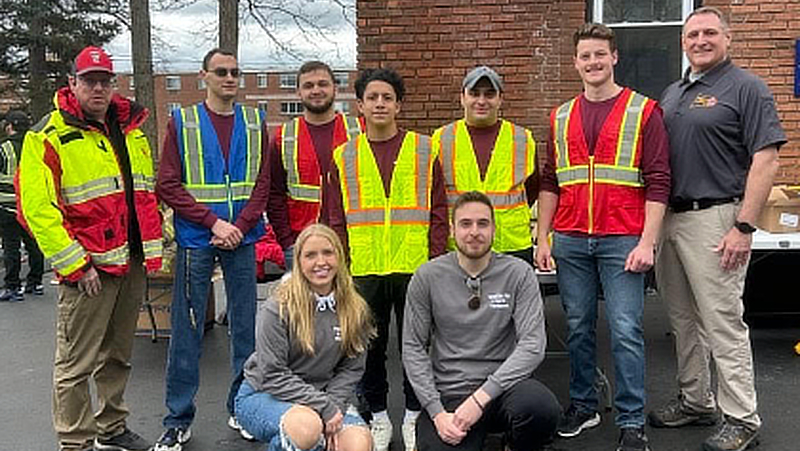
At its core, the student positions are focused on customer service, enabling them to build their interpersonal skills. While interacting with faculty, staff, and students, they learn to professionally address challenging questions, whether verbally or in writing. They understand what questions to ask as they serve their fellow Chargers.
"To see them excel means so much to me personally," said Scollo, who also serves as associate director of the University's award-winning Model United Nations program . "My role as an information literacy librarian allows me to be an educator. This program is one of those opportunities in which I get see students learn, develop, and apply my teaching to get ahead in life.
"Not only does this help them find better jobs, but it also helps them become lifelong learners," he continued. "It is extremely rewarding when former students reach out to me to talk about their new job, or just to catch up. It makes me very proud."
Scollo says that research supports the benefits of the program, and that many students who may be reluctant to interact with a staff librarian are more comfortable asking a fellow student for assistance. The student workers help foster a friendly and comfortable environment in which all students can feel comfortable seeking support.
Lauren Slingluff, M.S. , the University librarian, says the program's success is a testament to Scollo's leadership and training, as well as the students' commitment to the program.
"Having students provide research assistance in this way is unique for academic libraries," she said. "I'm constantly struck by their skill, their creativity, and their commitment to supporting other students. Some of our best ideas for program enhancements have come from our wonderful researcher-to-researcher team as they blend their knowledge of the student experience with their advanced library training."
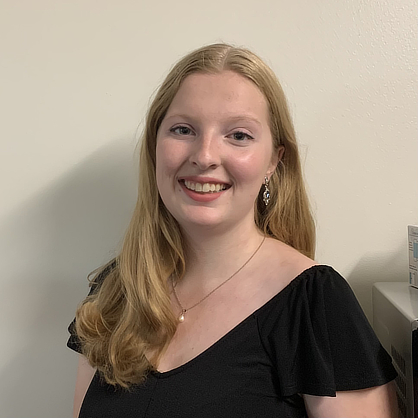
For Allison Mahr '24, who recently accepted her bachelor's degree in international affairs , the opportunity to collaborate with her fellow Chargers in the library was her favorite part of being a part of the R2R program.
Mahr, who recently earned a prestigious Boren Fellowship Award and will soon travel to the Republic of Georgia to continue her own research , says R2R was an incredible way for her to learn how to explain complex topics in a way that is understandable – a skill that she believes will be crucial as she completes her fellowship and begins graduate school.
"This program has been a remarkable opportunity to enhance my research skills and to learn from Joe Scollo about information literacy," she said. "I've also worked behind the scenes to help create some posters and graphics to help advertise library services, and I've been helping Joe and the other R2Rs revamp the library website and other key materials."
Scollo envisions the program helping students in all majors develop their own ability to learn – and teach others – as well as their critical thinking skills. Student workers become research experts, of sorts, and that's a skill that he believes will serve them well as they begin their careers or continue their education.
For Reeder, the new homeland security and emergency management grad, the program was a great way to serve the University community while also developing his own abilities. He's now applying for analytical positions with federal agencies such as the U.S. Secret Service, and he also plans to pursue his master's degree. He believes the program was a great way for him to develop the skills he'll need to excel.
"Through this program I have gained an advanced understanding of research methods, as well as a wide understanding of research databases across a variety of academic fields," he explains. "I've been able to use these skills from this position to benefit my personal research as a student and as a developing professional in the field of homeland and national security."
Recent News

Alum's Musical Career Enables Her to Be an Artist and an Industry Professional
Jenna McIlwrath '22 is a singer-songwriter who has also excelled in the music industry. Whether she's releasing her own new music or helping to sign new artists, she enjoys making connections and sharing her love for music.

Seniors Share Art and Design Projects with Charger Community
A group of art and design majors recently displayed their senior capstone projects as part of an exhibition in the University's Seton Gallery.
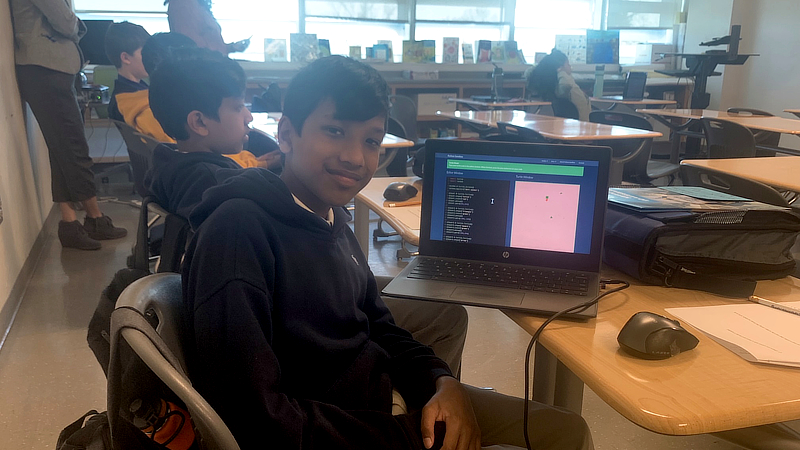
Unique Program Introduces Middle School Students to Math and Coding
The University’s Excellence in Math and Coding Chargers (E = MC2) was a fun after-school program for Engineering and Science University Magnet School students, offering them a sampling of math, coding, and life as a college student.
- Apply to UMaine
UMaine News
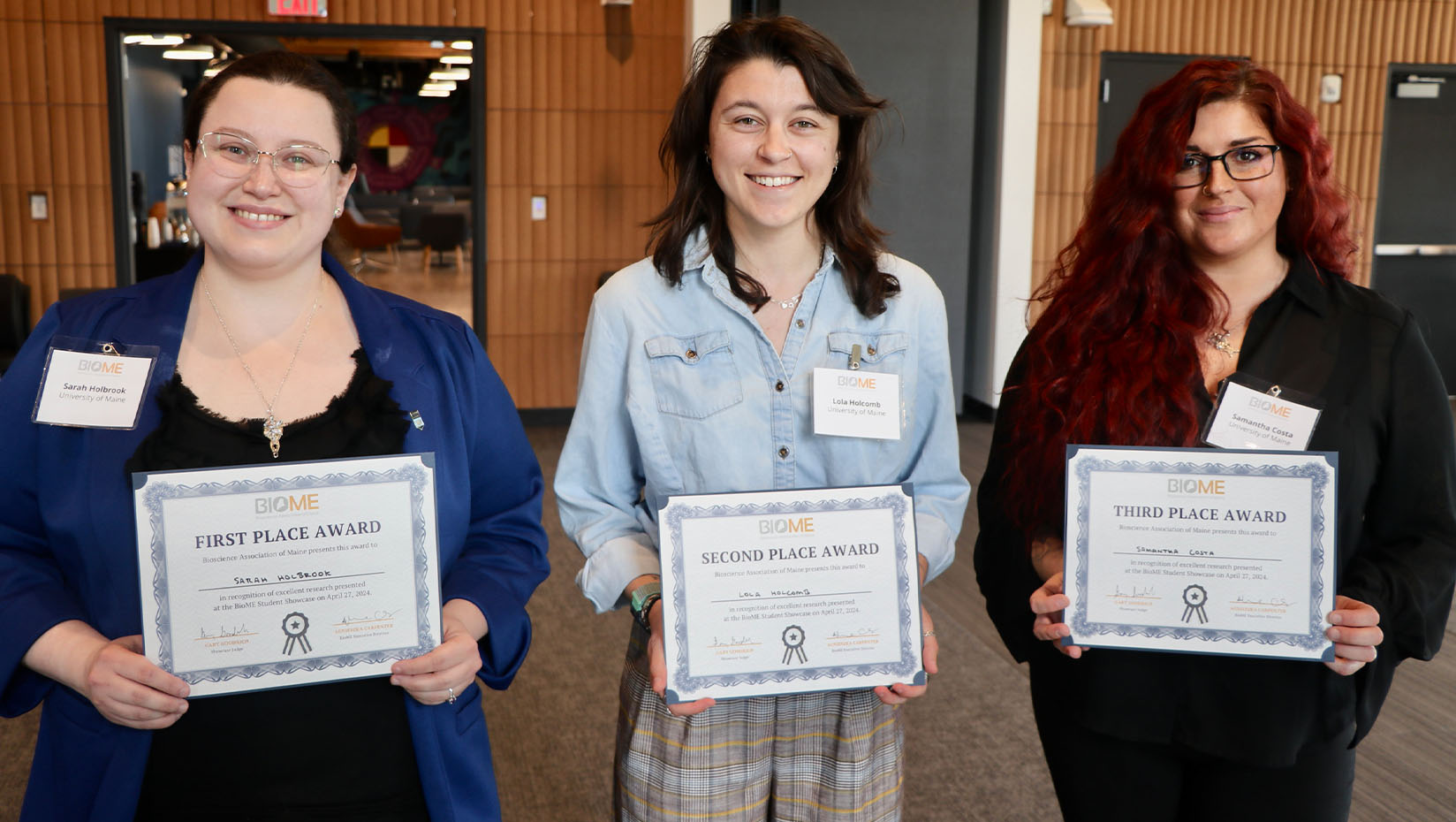
Graduate students sweep state competition for life science research
Three University of Maine graduate students placed as finalists in the 6th annual BioME Student Showcase for life science research. The annual event supports innovation and the commercialization of student ideas in Maine, and allows students the opportunity to network with professionals or connect with entrepreneurial resources. Ten UMaine undergraduate and graduate students were selected to participate in the competition, held April 27 at the University of Southern Maine McGoldrick Center in Portland.
Twenty-eight participated in the showcase across three different categories split by enrollment in high school or in a college undergraduate or graduate program. In order to be considered for the showcase, each student was required to submit an application.
Among college graduates, Sarah Holbrook placed first for her research titled “A Novel Category of Neuromuscular Disease: A Quest for a Cure”; Lola Holcomb finished second with research titled “ Developing ‘Microbiome Medicine’ with Broccoli and Bacteria”; and Samantha Costa placed third wit h “Increased PD-L1 expression in obese mice leads to bone marrow immunosuppression and increases the susceptibility for bone marrow metastases.” All three are UMaine students.
The graduate-level competition is called a “Fast Pitch” and was open to any graduate student enrolled in a Maine academic institution. Participants were required to share their research in a 5 minute pitch to judges with no more than five presentation slides, with the focus angled toward how their research could be commercialized. In-depth Q&A sessions followed their pitches and allowed them to demonstrate their knowledge of the subject. First to third place awards ranged from $2,500 to $700.
- UMaine Today Magazine
- Submit news

by Burk Krohe | May 28, 2024
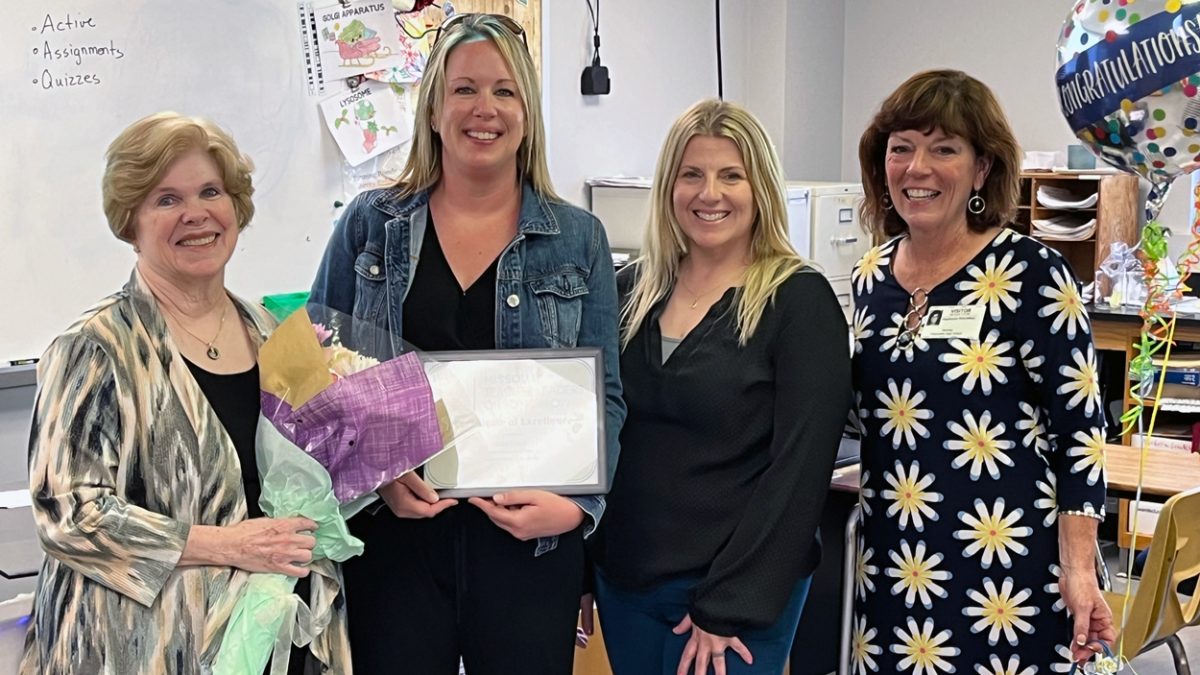
Lisa Foust (second from left) is surprised with the Missouri Teacher Leader of Tomorrow Award by Pam Stanfield, UMSL alum and former Milken Educator Award winner; Vicki Emerson, Pattonville High School teacher; and Stephanie Koscielski, the director of clinical experience and school partnerships at the UMSL College of Education. (Photo courtesy of David Stofer)
Lisa Foust was ready for her last practicum observation of the semester when she settled into her biology classroom at Pattonville High School on April 15.
“I got my lesson plan ready, and I got my students ready,” she recalled. “I always let my kids know when observation days were, they knew that it was an important part of my grade. They were excited to be a part of the process and show Stephanie how much they knew about what we were learning about in class.”
Foust had no idea that she was in store for more than a classroom observation. But something seemed off when she realized Stephanie Koscielski , her practicum supervisor at the University of Missouri–St. Louis, was running late.
When Koscielski finally arrived, she entered the classroom holding a bouquet of balloons, with several other people in tow. The fanfare was part of a surprise celebration to recognize Foust as a 2024 Missouri Teacher Leader of Tomorrow . She was among 10 student teachers in the state to receive the award from the Missouri Milken Educators.
Founded by the Milken Family Foundation , the Milken Educator Awards recognize excellence in education by honoring the country’s top teachers. In 2021, the Missouri chapter of the organization established the Missouri Teacher Leaders of Tomorrow Awards to honor student teachers and celebrate individuals with high potential to achieve greatness in education.
Earlier this month, Foust graduated from UMSL with a bachelor’s degree in secondary education and has accepted a position teaching science at Parkway South Middle School next school year.
Koscielski, who also serves as the director of clinical experience and school partnerships in UMSL’s College of Education , nominated Foust as a Missouri Teacher Leader of Tomorrow.
“Lisa is a knowledgeable, compassionate educator who is deeply committed to knowing each of her students personally and dedicating herself to teaching each one of them not only their biology content, but also meeting their social and emotional needs,” she said. “She is extremely flexible and versatile. In addition to classroom teaching, she coaches softball and basketball after school, and is a student council sponsor.”
Though Foust was recognized for excelling as a student teacher, she has worked in education for more than a decade as a substitute teacher, academic monitor and coach. She appreciates the nomination and views it as an extension of her previous contributions to the field.
“It’s nice to be acknowledged for all the time I have put in, how involved I am in the district where I work and how I’ve become skilled at doing what I do in the classroom,” Foust said.
Graduating college was a long-time goal for Foust, but the path to her recent success has been winding.
Growing up in Bridgeton, Missouri, she knew she wanted to be a teacher by the third grade. Her family camping trips and time in the Girl Scouts also piqued her interest in nature and biology.
After graduating high school, Foust attended St. Louis Community College–Florissant Valley but wavered on pursuing education. She got married, started a family and eventually put school on pause. A job in Missouri’s Juvenile Justice System working with the youth at a facility in Lincoln County reminded her just how much she enjoyed working with kids. The experience spurred her to make a change.
“I started as a substitute teacher in the Pattonville district when my kids were little because they went to Pattonville,” she said. “I had the freedom to go to classroom parties and field trips and stay home with them when they were sick. Seven years ago, I got hired on full-time at the high school as an academic monitor.”
In that role, Foust has worked with students who have been socially promoted throughout middle school to high school. Her main goal as an academic monitor is to help them stay on track academically, become better students, attend school on a consistent basis and to build relationships with each of them so they want to be in class and enjoy being at school.
That was also about the time she decided to go back to school.
Initially, she intended to enroll at another local university, but the administrators told her she could not enter an education program on a part-time basis. Undeterred, she came to UMSL, which offered flexible courses and supportive faculty and staff members.
“Everybody has been extremely helpful, accommodating,” Foust said. “I work at Pattonville full time, and I coach, too. I’m super busy, and they helped me get it figured out to where I could go to school, work, coach and have time to live.”
Given Foust’s experience as a substitute teacher and academic monitor, the transition to teaching biology has been one of ease. She noted that the key to success as an educator is classroom management and part of effective classroom management is a sense of mutual respect with students.
“My students know I’m the boss, but that they get a say in how we do things in the classroom,” she said. “They determine the norms of the class. Obviously, I am going to push them in the right direction for the setting of norms, but they feel like they are an important part of the little family that we have for the hour we are together.”
Foust also prioritizes connecting with students on a personal level.
“I feel like it gets lost in the daily grind,” Foust said. “We’re teaching humans, and they have interests, they have the best personalities, and they are funny. Getting to know them is the best part of my job. Of course, there are teacher-student boundaries, but if they want to tell me about something, I’m going to listen and I’m going to remember. I work hard to remember their names, so on the second day of school I can call them by name, they know I see them and that they are important to me.”
Foust intends to pursue a master’s degree at some point in the future, but for now, she is enjoying her graduation from UMSL.
“It’s been my biggest goal my whole grown-up life. My brother and sister, my mom and dad, nobody has a degree, I am the first one to graduate college,” she said. “I do not know what I am going to do with myself because graduating college has been No. 1 on my to-do list for such a long time. But, graduate college, I am going to check that box finally. It is huge.”

LATEST NEWS

YOU MIGHT ALSO LIKE

Dr. Angel Novel Simmons named associate dean of student services and alumni relations for the College of Optometry
She is focused on supporting students and also building up the college’s alumni presence, including reinstating a quarterly newsletter showcasing alumni achievements and hosting the annual August Academe.
May 31, 2024

John Nichols entertains through multiple mediums and works to diversify golf
Nichols previously served as the head of Yahoo!’s NBA social media platforms and is now the host of “One More Round” on ESPN and cohost of the “Jenkins & Jonez” podcast.
UMSL alum Laura Burkemper helps others build their brands and scale their businesses
May 30, 2024
She also recently co-authored a book, “Empathy and Understanding in Business,” with expert negotiator Chris Voss.
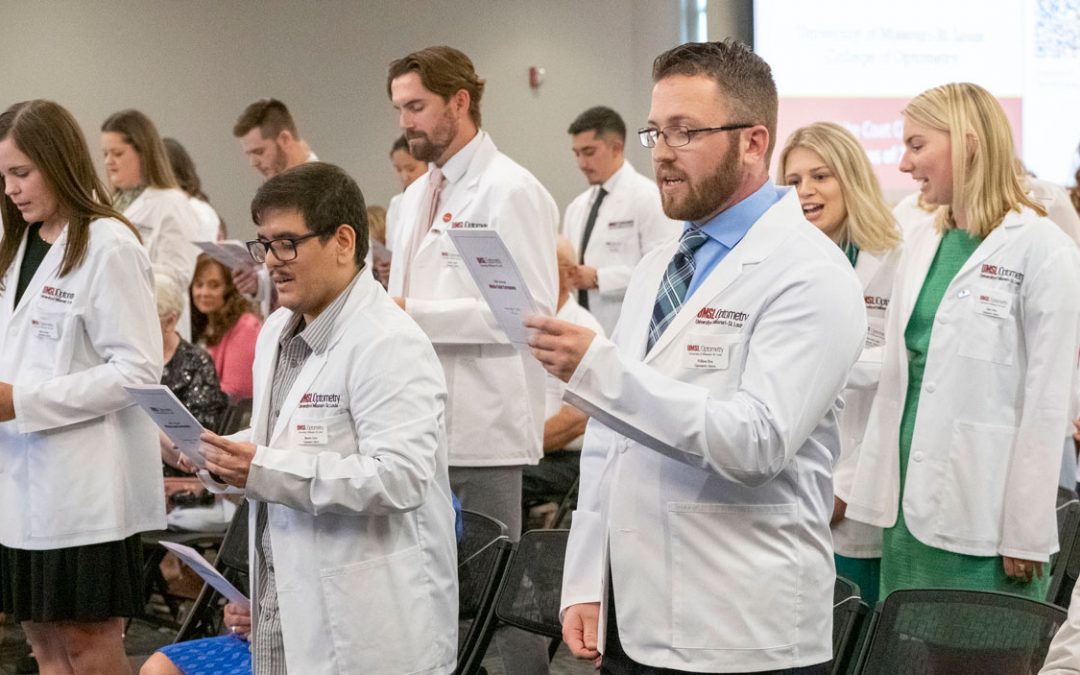
Eye on UMSL: Taking the oath
Members of the College of Optometry’s 2026 graduating class recite the Optometric Oath during the 25th annual White Coat Ceremony on May 17.
May 28, 2024
- Skip to primary navigation
- Skip to main content
- Skip to primary sidebar
- Skip to footer
Shenandoah University
The Big Little University Rising
Shenandoah University News
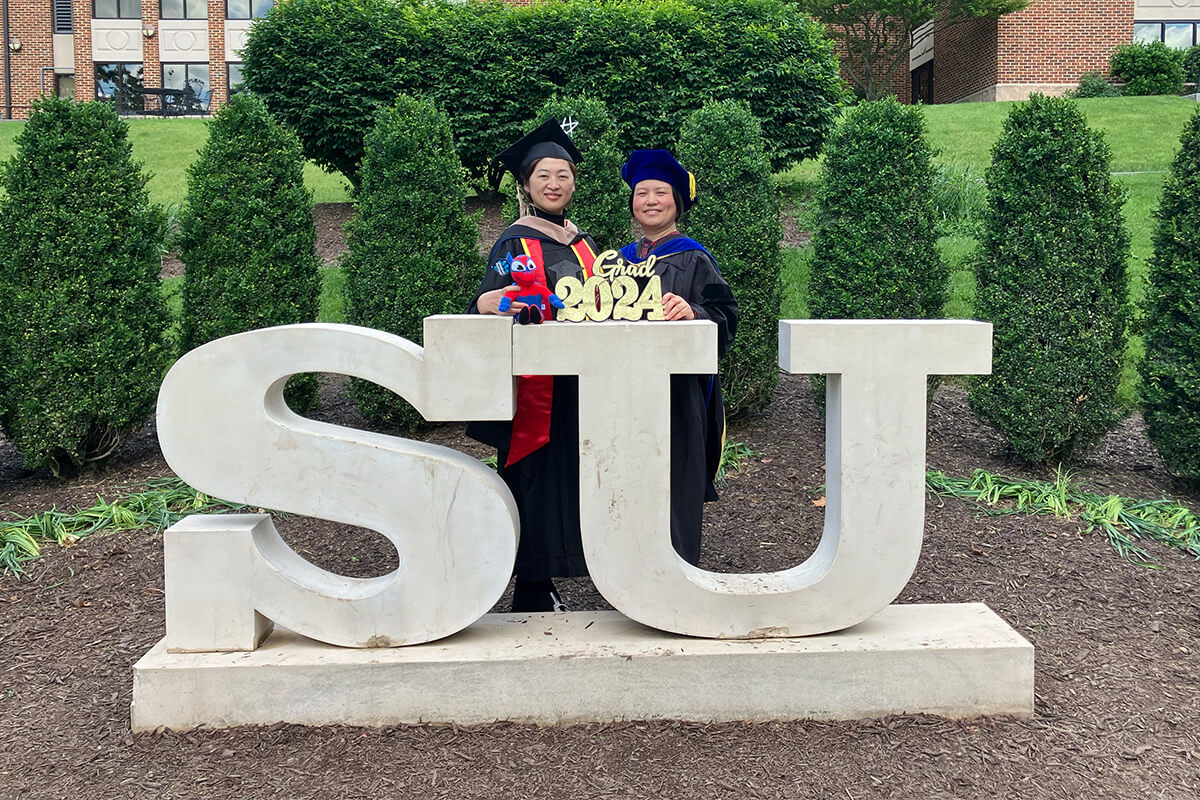
Global MBA Students Visit SU Campus Jinling, Juxia, And Yu Participate In Graduate Hooding Ceremony
May 29, 2024
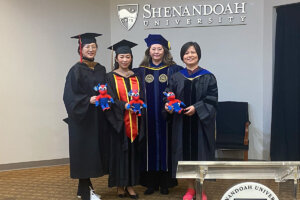
L to R: Qu (Malina) Jinling, Bai Yu, and Hou (Eller) Juxia (right) and SU Global’s Dr. Yvonne Chen (center right)
Global MBA students Qu (Malina) Jinling (MBA ’24), Hou (Eller) Juxia (MBA ’24) and Bai Yu (MBA ’24) visited their American alma mater, Shenandoah University , in Winchester, Virginia, on May 17. During their visit, they participated in a hooding ceremony with Head of SU Global and Associate Dean of the Business School Yvonne Chen , Ph.D., and Associate Professor of Business, Sustainability and Society Giles Jackson , Ph.D. They also toured the campus.
Jinling, of Shanghai, China, is a senior production manager for Savills China , one of the world’s leading property agents. The company specializes in architecture, design, and project management, with offices across the Americas, Europe, Asia Pacific, Africa and the Middle East.
Jinling’s background includes interior design and program management. She manages a group of designers, product managers, and other cost controllers. She said she found the MBA helpful in expanding her knowledge and adapting what she learned in her day-to-day work. She also liked connecting with the faculty.
At Shenandoah University, all the professors were helpful. They gave us confidence and support along our journey.” Qu (Malina) Jinling, MBA ’24, Senior Production Manager, Savills China
Juxia, also from Shanghai, is a senior production manager for OmniVision Semiconductor Shanghai , a leading developer of advanced digital imaging, analog, and touch and display solutions. The firm produces semiconductors for mobile phones and the automotive industry. She supports about 500 operators and manages production management for the company. With decades of experience in engineering, purchasing, production, and quality management, Juxia said she found the Global MBA program helpful in synthesizing theory and real-world practice.
In my job, I coordinate with different departments, suppliers, and stakeholders. I came to Shenandoah University to learn how to integrate theory into that work experience. I learned to think deeply and globally about business, and just to grow.” Hou (Eller) Juxia, MBA ’24, Senior Production Manager for OmniVision Semiconductor Shanghai

Bai Yu (center) with family and Dr. Yvonne Chen (right)
Yu, from Beijing, is the director of R&D Center Operation and Facilities for Novo Nordisk China , a top multinational pharmaceutical company with global innovation and leadership in diabetes treatment. Yu holds a Doctor of Veterinary Medicine degree. She manages the company’s R&D center facilities, compliance, and animal ethics issues in China. She also supports innovation initiatives. After the hooding ceremony, Yu attended a health conference in West Virginia on May 18 with her family.
To learn more about SU Global graduate programs, including the Global MBA and the Global Doctorate (D.Prof) in Organizational Leadership Studies , visit su.edu/global.
Recent News

Shenandoah Announces Recipients Of 2024 Algernon Sydney Sullivan Awards
Annual awards presented to Maya Horner ’24, Gabriella Raspanti ’24 and Associate Professor of PA Studies Michelle Gruver, D.M.S., PA-C.
May 31, 2024

Shenandoah University Receives Grant to Connect Young People Across Regions Through Virtual Exchange
A grant from the J. Christopher Stevens Virtual Exchange Initiative will enable Shenandoah University’s Virtually Going Global to prepare young people in the United States, Middle East, and North Africa for the future through a unique global learning experience.

Shenandoah Center for Immersive Learning Hosts Cadets From Winchester Civil Air Patrol
Cadets engaged with immersive technology while touring Shenandoah University’s SCiL Lab

Global MBA Students Visit SU Campus
Jinling, Juxia, And Yu Participate In Graduate Hooding Ceremony
Monthly Archives
- February 2024
- January 2024
- December 2023
- November 2023
- October 2023
- September 2023
- August 2023
- Mission & Vision
- Strategic Plan 2025
- Accreditation
- Online Privacy Policy & Practices
- Contact Admissions
- Visit Shenandoah
- Conservatory Audition Requirements
- Admitted Students
- Get Social with SU Admissions
- Find Local Hotels
- All Programs & Majors
- Search For Courses
- Health Care Programs
- Online Programs
- Athletic Majors & Careers
- Undecided Students
- Registering Courses as a Visiting Student
- Academic Calendars
- Academic Catalogs
- Faculty Directory
- Learning Support Services
- All-Steinway School
- Transformative Teaching & Learning
- Commencement
- Smith Library Hours
- Databases and e-Resources
- Research Guides
- Tuition & Fees
- Payment Plan
- Transcript Requests
- Parent/Person Proxy
- Office of the Registrar
- Online Services
- Information Technology
- IT Help Desk
- Shenandoah Email
- Login to Hornet Hub
- Login to Canvas
- Login to WEPA
- Events Calendar
- Athletics Calendar
- Performance Calendar
- Join a Club
- Intramural Sports
- Worship Services
- University Bookstore
- Career & Professional Development
- Disability Services
- Health & Safety
- Student of Concern
- Title IX & Sexual Misconduct Policy
- Dining & Catering Services
- Shenandoah Today
- What’s New at SU
- SU Quick Facts
- SU Google Extension
- SU Chrome Browser Extension
- Campus in Google Maps
- Sustainability
- Employment Opportunities
- Apply for GCP
- Parking Permits
- Submit a Work Order
- Employee Departmental Forms
- Departments & Offices
- Room Reservations
- Conservatory Venue Reservations
- Filing a Complaint
- Campus Safety
- Emergency Operations Plan
- Sign Up for Emergency Alerts
- Campus Closure Policy
- Text Only Site
I Am A…
- Application Information
- Financial Aid
- Hornet Central
- Areas of Study
- I’m Not Sure What To Major In
- First Year Seminar
- Education Abroad
- I’ve Been Admitted
- Transferring Credit
- Campus Locations
- Campus Events
- Campus Dining
- Etrieve E-forms
- Academic Advising
- Community Service
- Commencement Information
- Search all Courses Offered
- Course Registration Information
- Undergraduate Summer Courses
- Winchester & Beyond
- Family Weekend
- Employee Forms
- Etrieve E-forms and Content
- Human Resources
- Create or Edit Your Faculty Profile
- Child Care Center
- Work Orders
- Faculty Handbook
- Center for Transformative Teaching & Learning
- Alumni Association
- Request Your Transcripts
- Give Back to SU
- Search for Courses
- Shenandoah Conservatory Arts Academy
- Performances
Quick Links
- Campus Maps
- University News

IMAGES
VIDEO
COMMENTS
Academic blogs are a great way to pick up chatter about what's brewing in scholarly publishing and what researchers think about specific aspects of academia. They are also a great source of essential tips and guidance for researchers and PhD students as they advance through their academic careers. This article lists 40 popular academic blogs that every researcher and PhD student needs to read!
As an ex-doctoral student now co-supervising five students, I feel your pain. "A Happy PhD" is a blog where I distil what has worked for me, as well as recent research in doctoral education, psychology and many other fields. Join our newsletter, or follow the blog on Twitter, Facebook, or via RSS.
PhDStudent Blogs The PhDStudent blog network chronicles life in academia today through the eyes of students faculty, and researchers. Meet our Bloggers HERE and We are calling for contributors Browse the blogs or search below. Job Searching for Postgrads You have decided you want to do a postgraduate degree, but you are wondering about how it may affect […]
The blog is filled by humor about the ups and downs of graduate school, as provided by a number of sources. Productivity. Academic Life: this blog focuses on productivity tips for aspiring and established academics, including reading suggestions, and a free e-book titled 4 Common Mistakes Every PhD Student Should Avoid.
20. Enjoy your PhD! It can be tough, and there will be days when you wish you had a 'normal' job, but PhDs are full of wonderful experiences and give you the opportunity to work on something ...
General life hacks for the PhD student. The latest blogs cover issues around completing a PHD in a pandemic, academic networks and book recommendations for writing your thesis. Join the The Thesis Whisperer, aka Professor Inger Mewburn, and other special guests on 17 June at the Postgraduate Researcher's Conference. The Dutch PhD Coach
This dissertation blog covers topics that help PhD students prepare for and transition into life after academia. Even if you're not quite ph (inishe)d yet, From PhD to Life will definitely give you something to look forward to - and tips to help you plan practically for it. I particularly like the light, conversational style - it's a ...
AMS Graduate Student Blog: This is a blog for and by math grad students. Benchfly: BenchFly was founded with a single desire: To increase the pace of scientific discovery. Although it is targeted at a scientific audience, the content covers a variety of topics relevant to general grad school life. Blog Them Out of the Stone Age: Winner of a few ...
4. Only a model. A website and blog by a fellow PhD student in Structural Engineering. Interesting posts on finite element modeling, workflow processes and academic teaching. 5. Dr Sustainable. Only about a month old, this blog has managed to provide some great content and a lively forum with comments.
PhD study tip #1: Write early and write often. PhD study tip #2: Read lots of papers. PhD study tip #3: Read other things. PhD study tip #4: Work in short sprints. PhD study tip #5: Focus on small signs of progress. PhD study tip #6: Don't cut corners. 6 Essential Study Tips for the PhD Student main image. Discover how to find and fund a PhD.
Here are 30 Best PhD Blogs you should follow in 2024. 1. The Thesis Whisperer. The Thesis Whisperer blog is dedicated to the topic of doing a Ph.D. and being an academic in the neo-liberal precarious academy that we (kinda) love. Since 2006 I have worked exclusively with Ph.D. students and early career academics.
PhD Blogs. by Hannah Slack. PhDiary #1: "Everything is on Fire, but This is Fine" - My First Week. PhDiary Student Voices Humour. Welcome to our PhDiary! To kick this series off, Hannah reminisces about her first week as a History PhD student. From the fiery flames of stress to the warm moments of success, hopefully her story can offer some ...
2021-22 Graduate Student Blog Vision. Hello AMS Graduate Student Blog readers! I would first like to thank Caleb McWhorter and the previous writing team for their work and dedication to the success of the blog. My name is Jasmine Camero and I am the new editor-in-chief for the AMS Graduate Student Blog.
Grad 101 Blog. Friday, Apr. 5, 2024. Starting a business as a non-business Ph.D. student at Rice University can be a daunting yet rewarding endeavor. By Carly Graverson Friday, Apr. 5, 2024 ... By Bohan Zhang, PhD Student in History Monday, Feb. 26, 2024. Houston's Northwest China Cuisine Map
So here are 20 amazing websites or resources for PhD students. Table of Contents. 20 Amazing Websites and/or Resources For PhD Students . ... It not only provides peer-reviewed articles but also news, blog posts, videos and even podcasts on one page. Meaning, you can remain updated with your subject or topic. ...
4 Tips for Applying to a PhD. Gain valuable insight from our collection of exclusive interviews with both current and past PhD students. Learn from their best advice, personal challenges and career path after completing their doctorate. Keep up-to-date on postgraduate related issues with our quick reads written by students, postdocs, professors ...
In the end, the graduate student blog is about opening minds and drawing readers into a research community that is special in ways impossible to quantify. "A PhD can be wild," says blogger and computer scientist Irene C. Her piece, "My Road to Yelp Elite," catalogues her comic quest to dine at 180 restaurants, review them for the online ...
Showing families around the UK. As an international PhD student in the UK, one of the common experiences we may encounter is to have families visiting us in this foreign land where we are living and studying. In this week's blog, Ivy shares her experience of showing her families around the UK. By Ivy Zhuo.
A PhD application requires a lot more thinking about the validity and worthiness of a project, as well as a greater knowledge of the topic your thesis addresses and the discipline you are working in. The PhD proposal itself is a much longer document and includes sections such as research context and a timeline for successfully completing your work.
Search Grad School Admissions. Search up-to-date admission results to more than 250 graduate schools. With over 840,000 admission results submitted, TheGradCafe helps millions of grad students each year with their admissions journey. Search.
Here are a few of the reasons they feel writing and blogging in particular is a great opportunity for PhD students! You get to explain what you love to the public. You got into your field because you love it and it's only natural to want to understand why you do. A blog is a fantastic opportunity to explain to the general public how your area ...
To save for summer travels, I tutor on the side and today I have an hour of A/L biology class. I spend the rest of the evening baking! My first attempt at cinnamon buns are quite successful and I cover up any burnt bits with lots of icing. I made dhal, jackfruit curry and rice for dinner and switch on an episode of the new season of Drive to ...
Free Higher Education News, Jobs, Career Advice and Events for college and university faculty, adjuncts, graduate students, and administrators.
This guide contains everything you need to start a blog today. It includes: Reasons why academics should blog. Examples of successful academic blogs - both from PhDs and PhD students. A step-by-step guide for planning a successful academic blog. Resources for finding a web host and setting up your blog.
When the PhD path leads to career struggles. Updated May 28, 2024, 2:30 a.m. A bird flew past a rainbow on the horizon, as viewed from Morrissey Boulevard in Dorchester. Pat Greenhouse/Globe Staff ...
As a graduate student, you'll be surrounded by like-minded peers, professors invested in your success, and plenty of university-sponsored resources that can help you make valuable connections. ... The best of our graduate blog—right to your inbox. Stay up to date on our latest posts and university events. Plus receive relevant career tips ...
A new graduate of the University's homeland security and emergency management program, Reeder was a student worker for the library's Researcher 2 Researcher (R2R) Program. He and his fellow student workers, who received a comprehensive training before beginning their positions, are committed to making sure members of the Charger community find ...
Three University of Maine graduate students placed as finalists in the 6th annual BioME Student Showcase for life science research. The annual event supports innovation and the commercialization of student ideas in Maine, and allows students the opportunity to network with professionals or connect with entrepreneurial resources. Ten UMaine undergraduate…
Earlier this month, Foust graduated from UMSL with a bachelor's degree in secondary education and has accepted a position teaching science at Parkway South Middle School next school year. Koscielski, who also serves as the director of clinical experience and school partnerships in UMSL's College of Education, nominated Foust as a Missouri ...
Global MBA students Qu (Malina) Jinling (MBA '24), Hou (Eller) Juxia (MBA '24) and Bai Yu (MBA '24) visited their American alma mater, Shenandoah University, in Winchester, Virginia, on May 17.During their visit, they participated in a hooding ceremony with Head of SU Global and Associate Dean of the Business School Yvonne Chen, Ph.D., and Associate Professor of Business, Sustainability ...